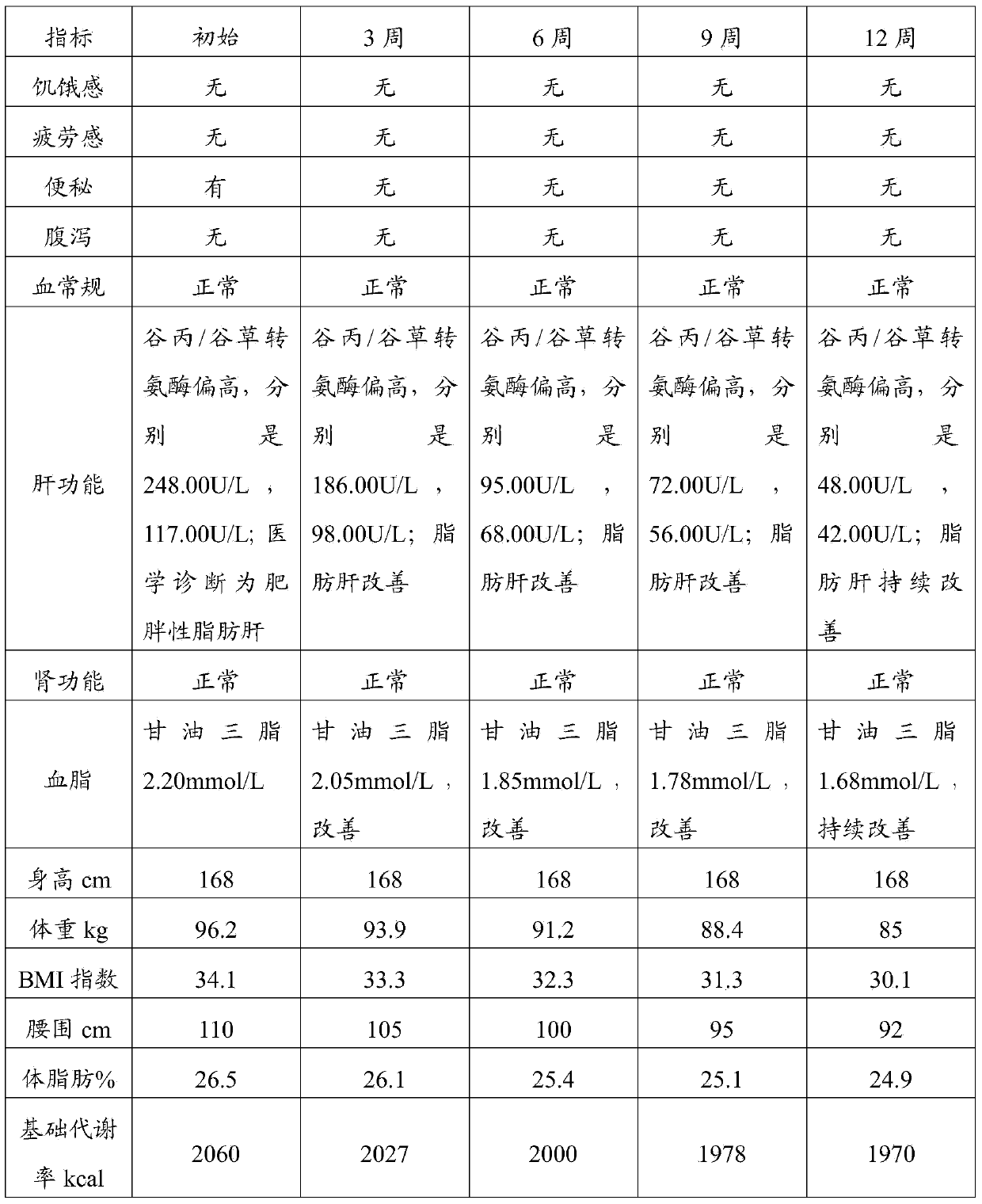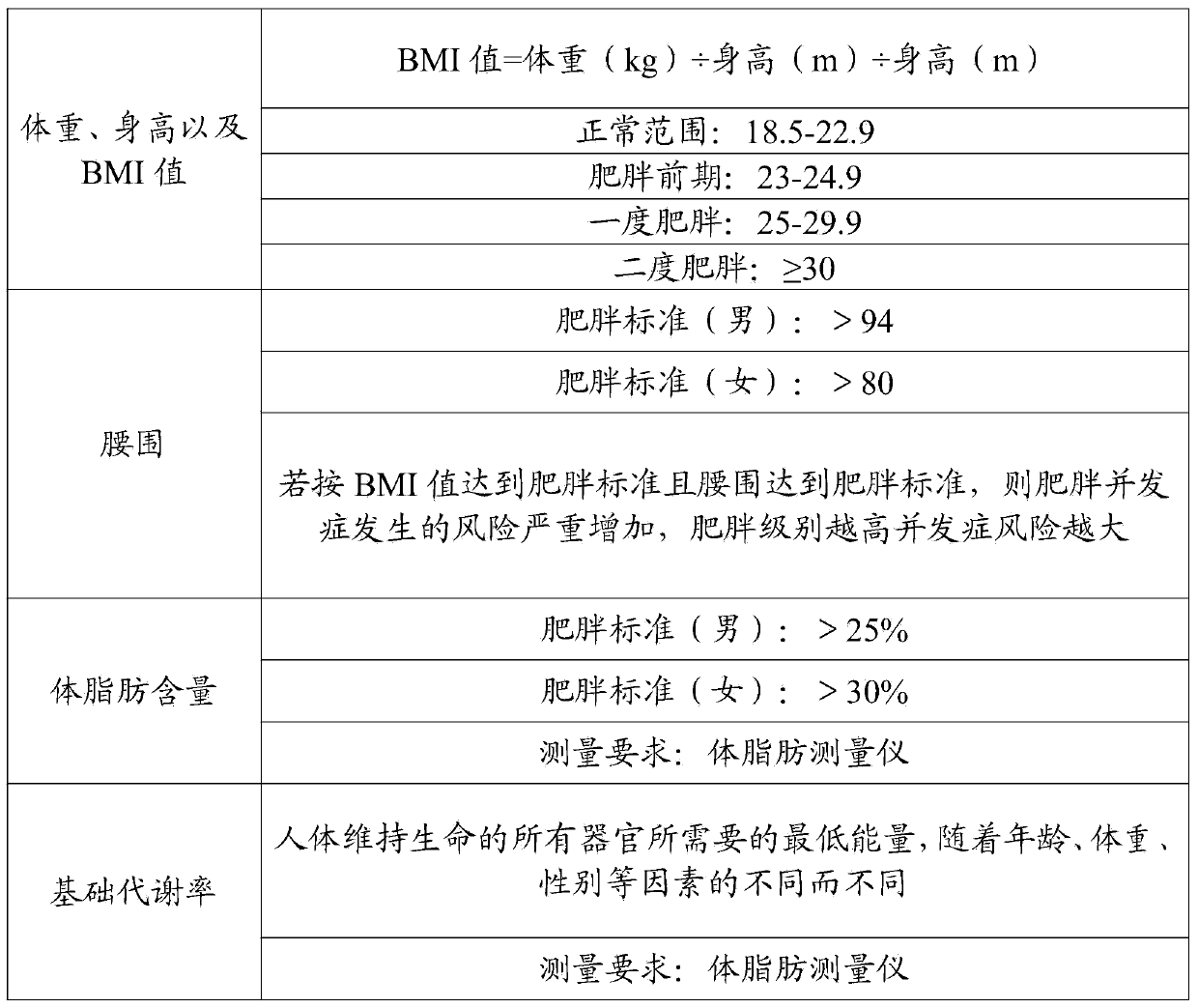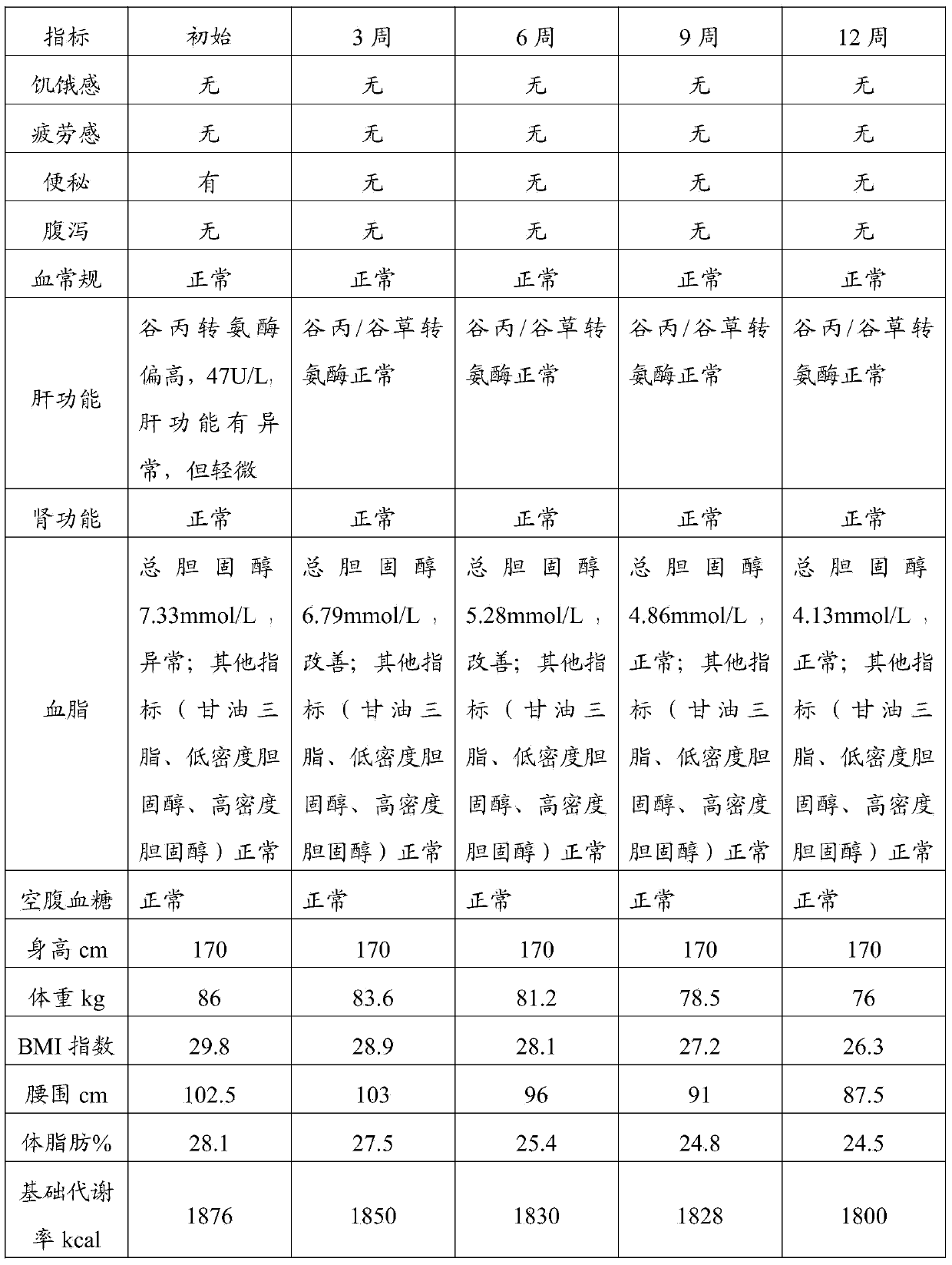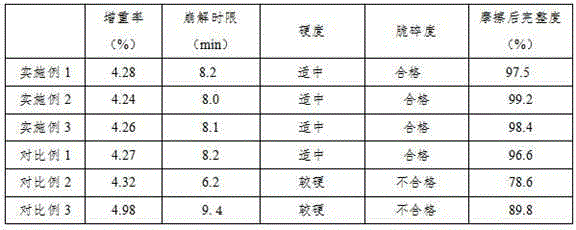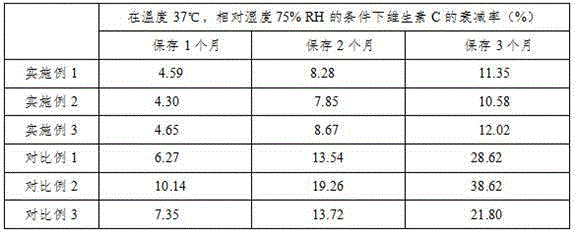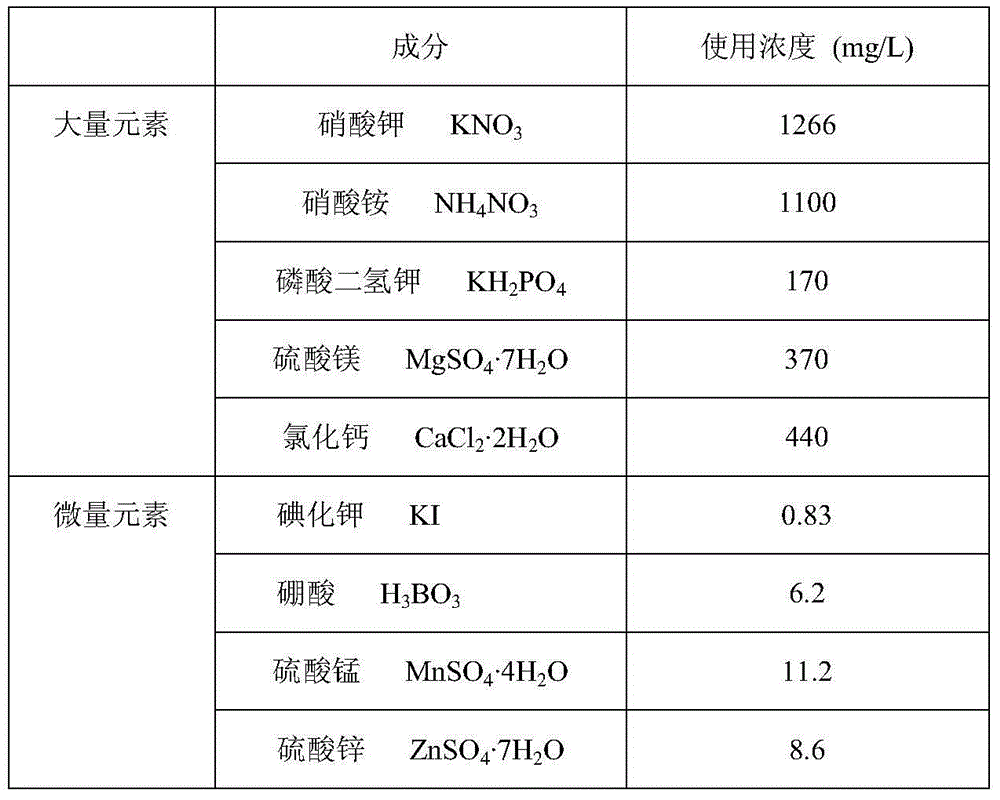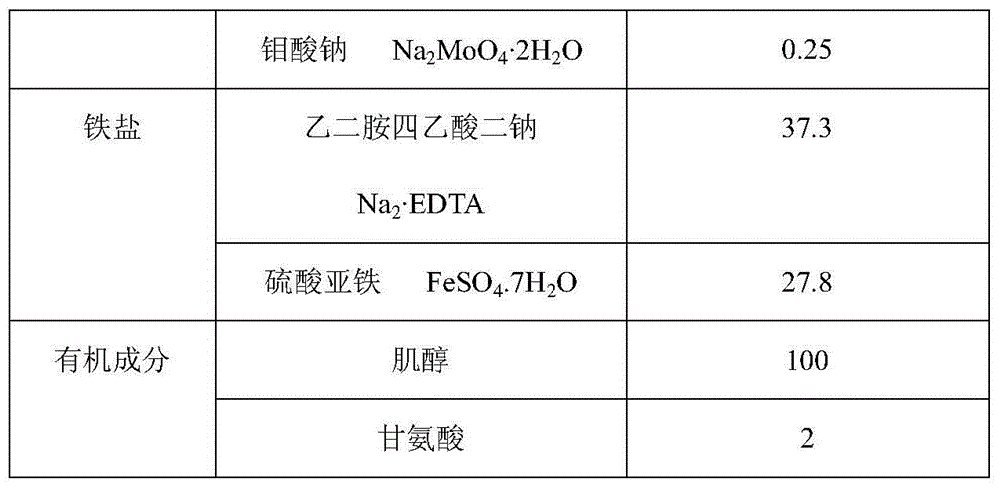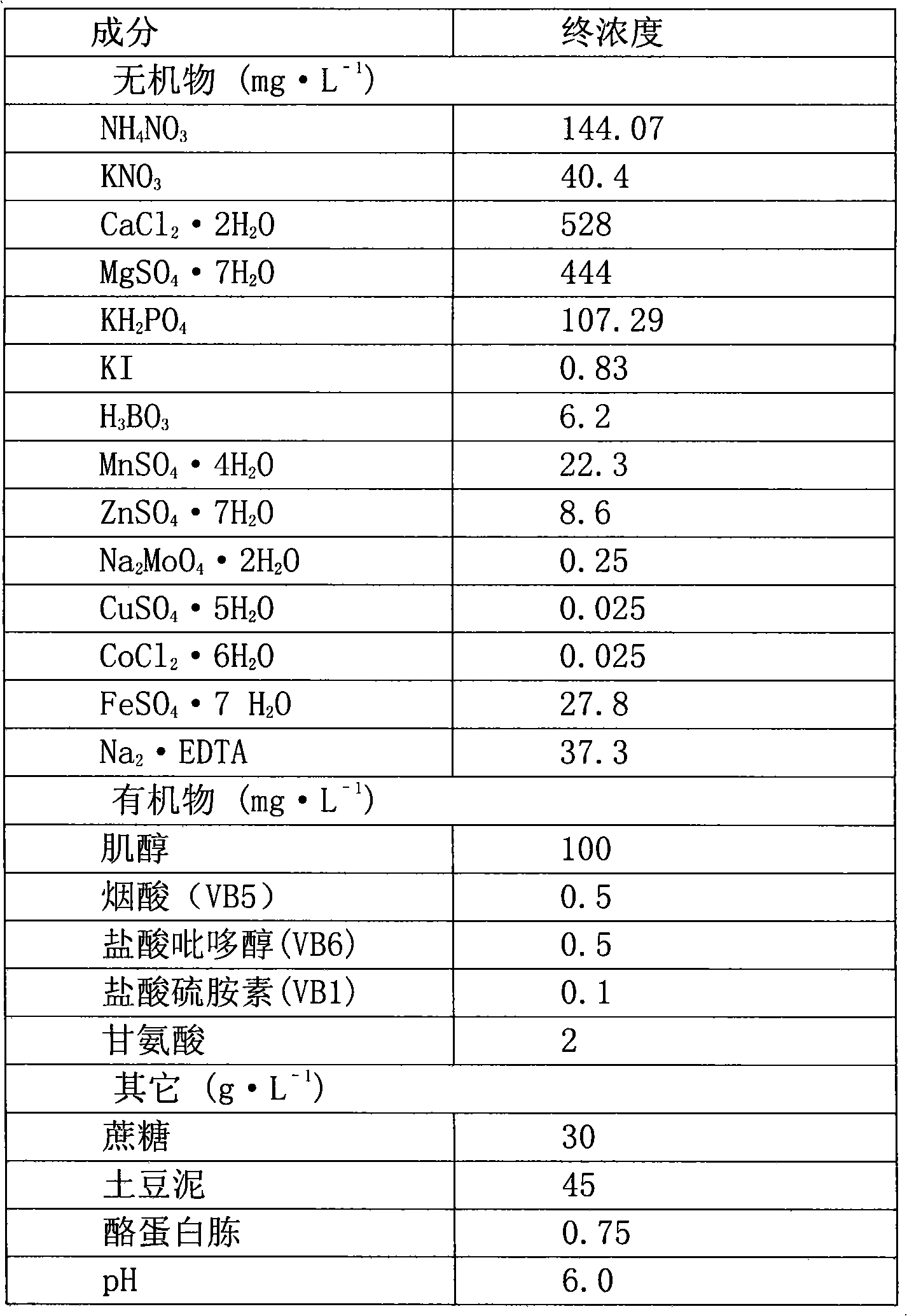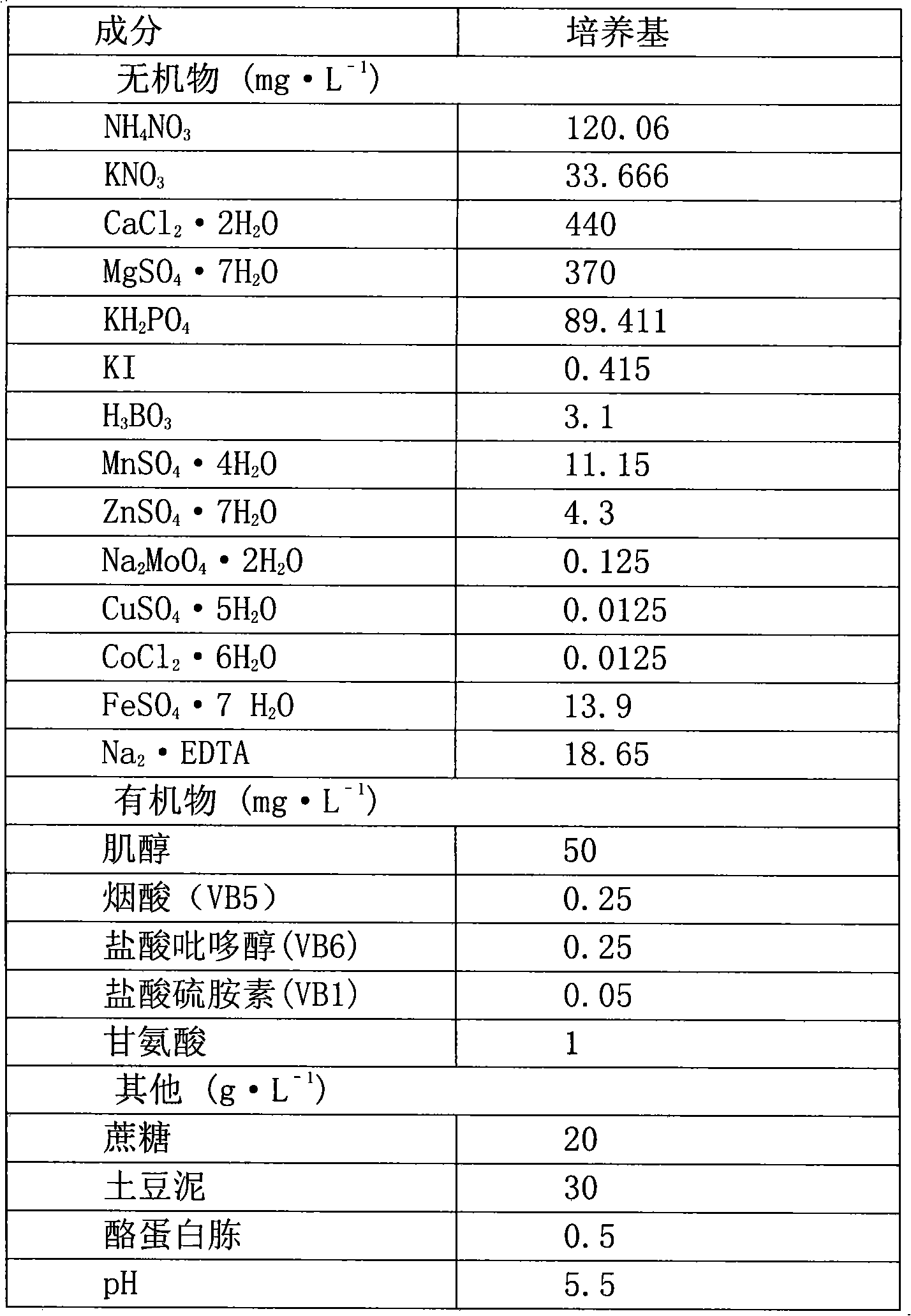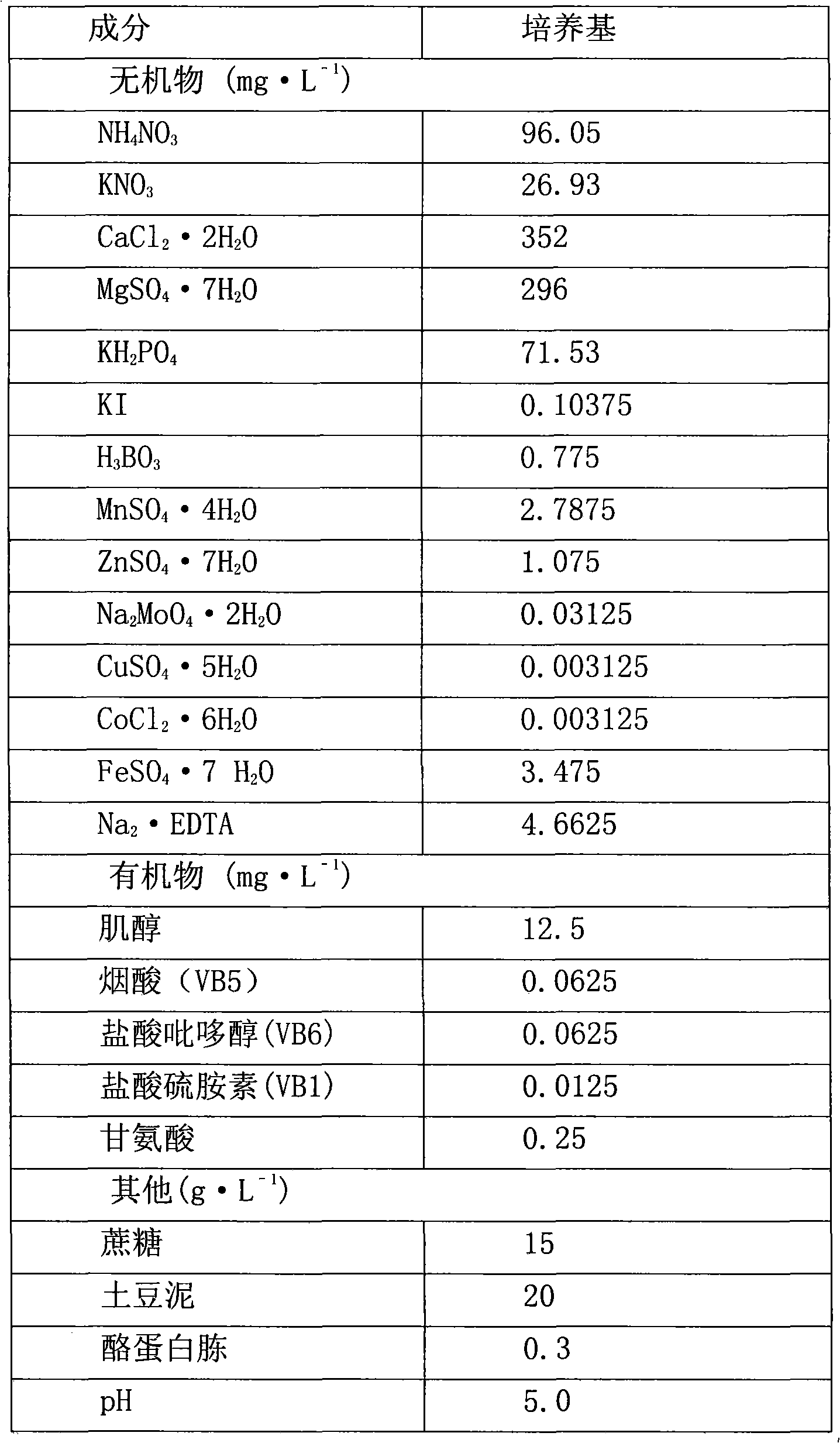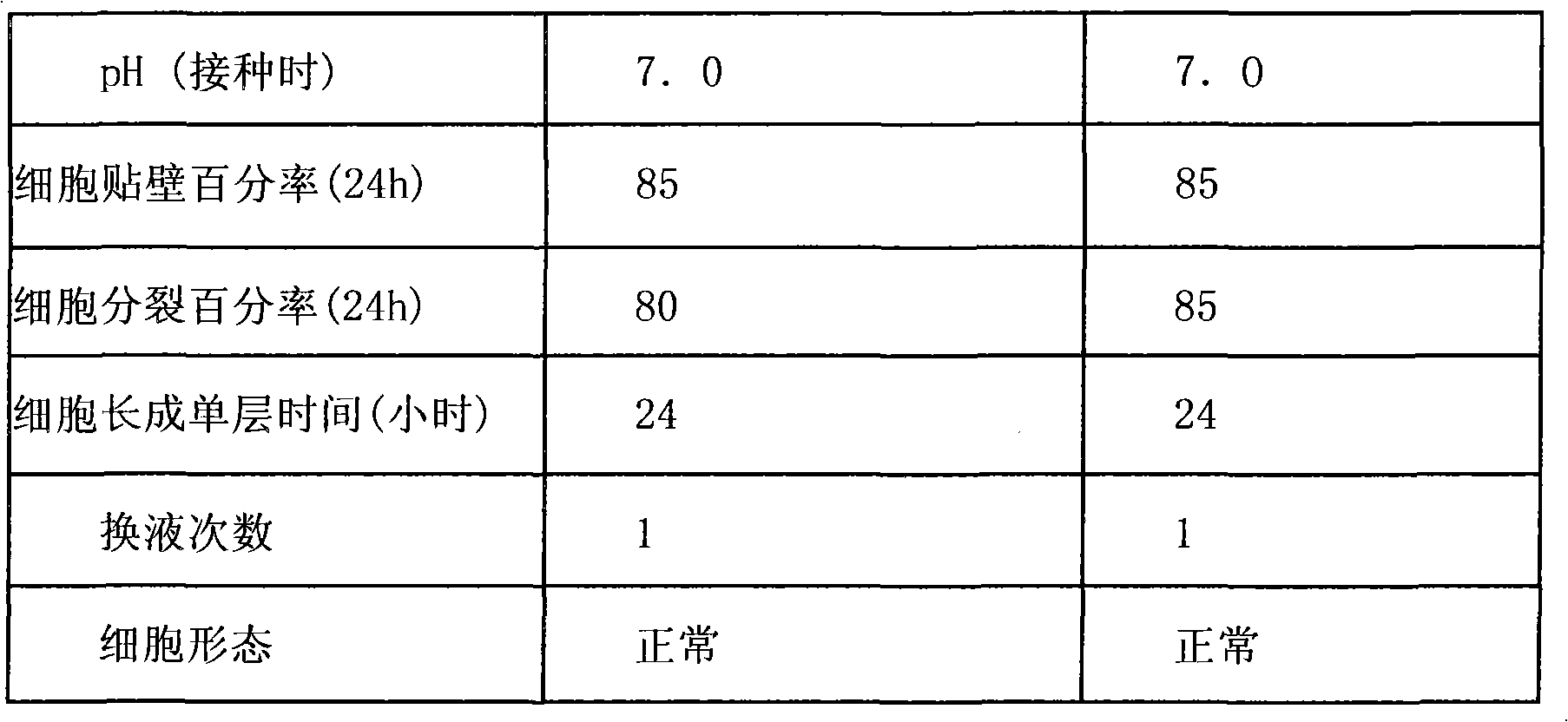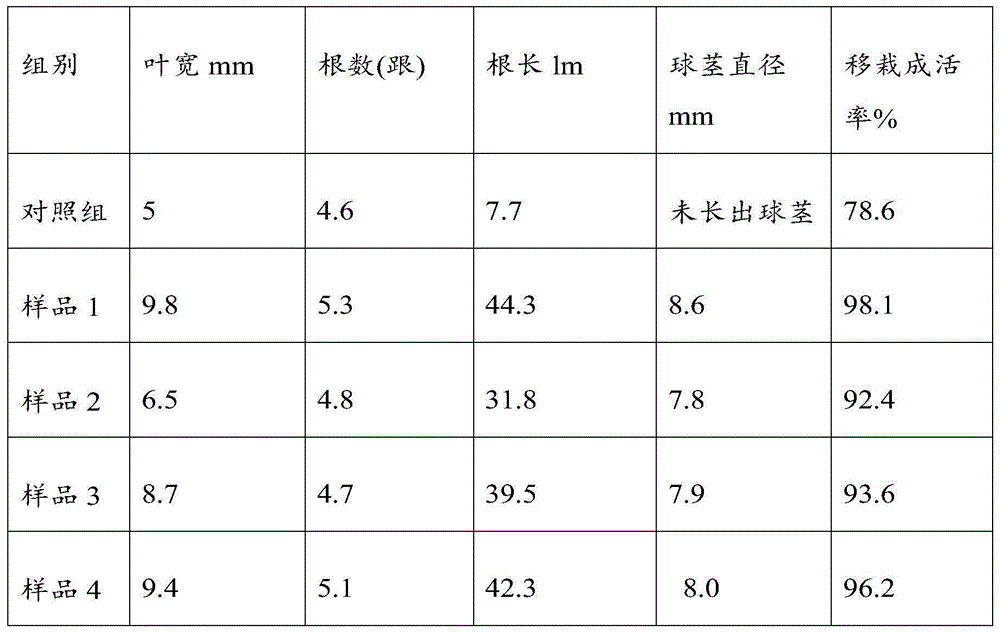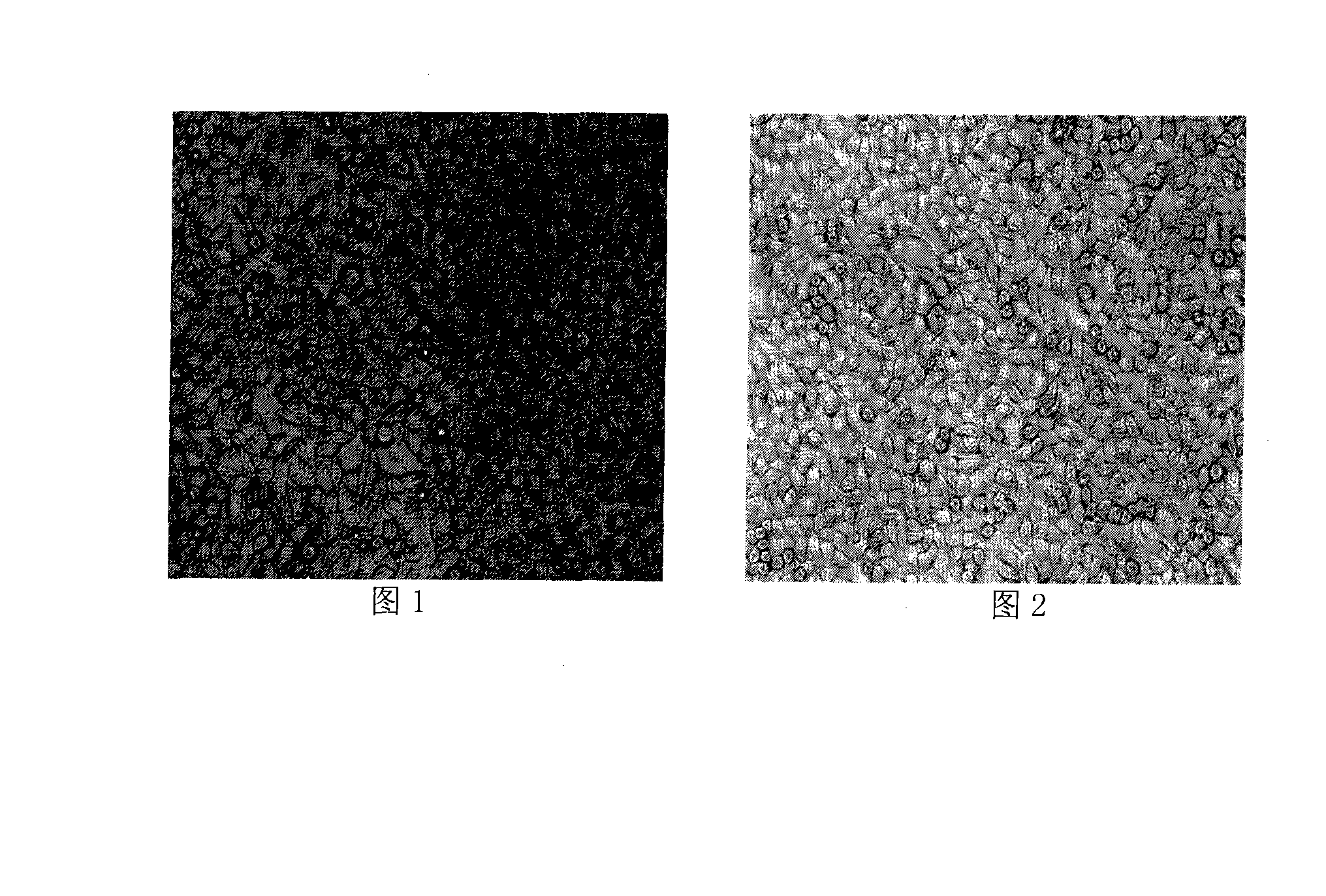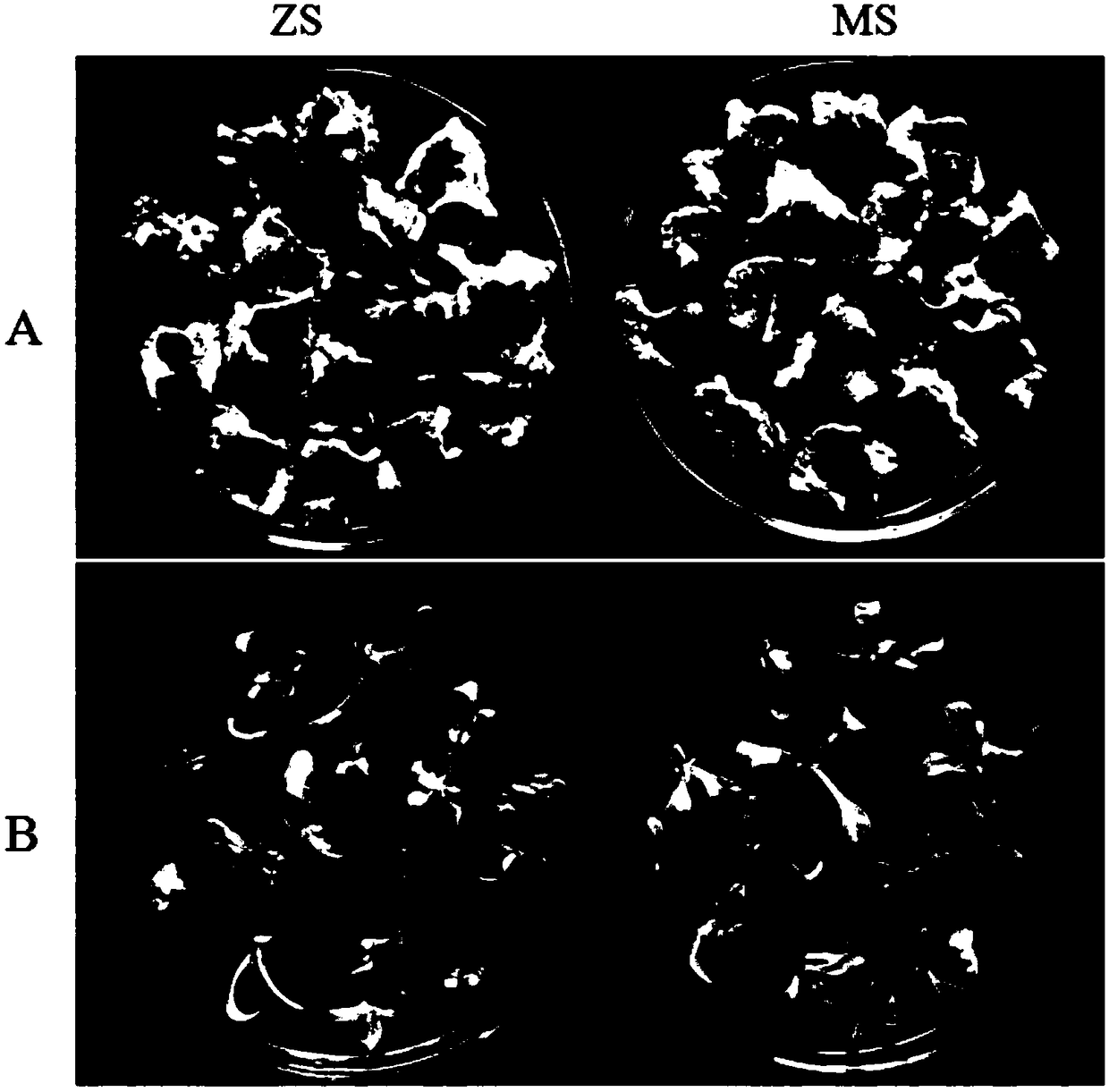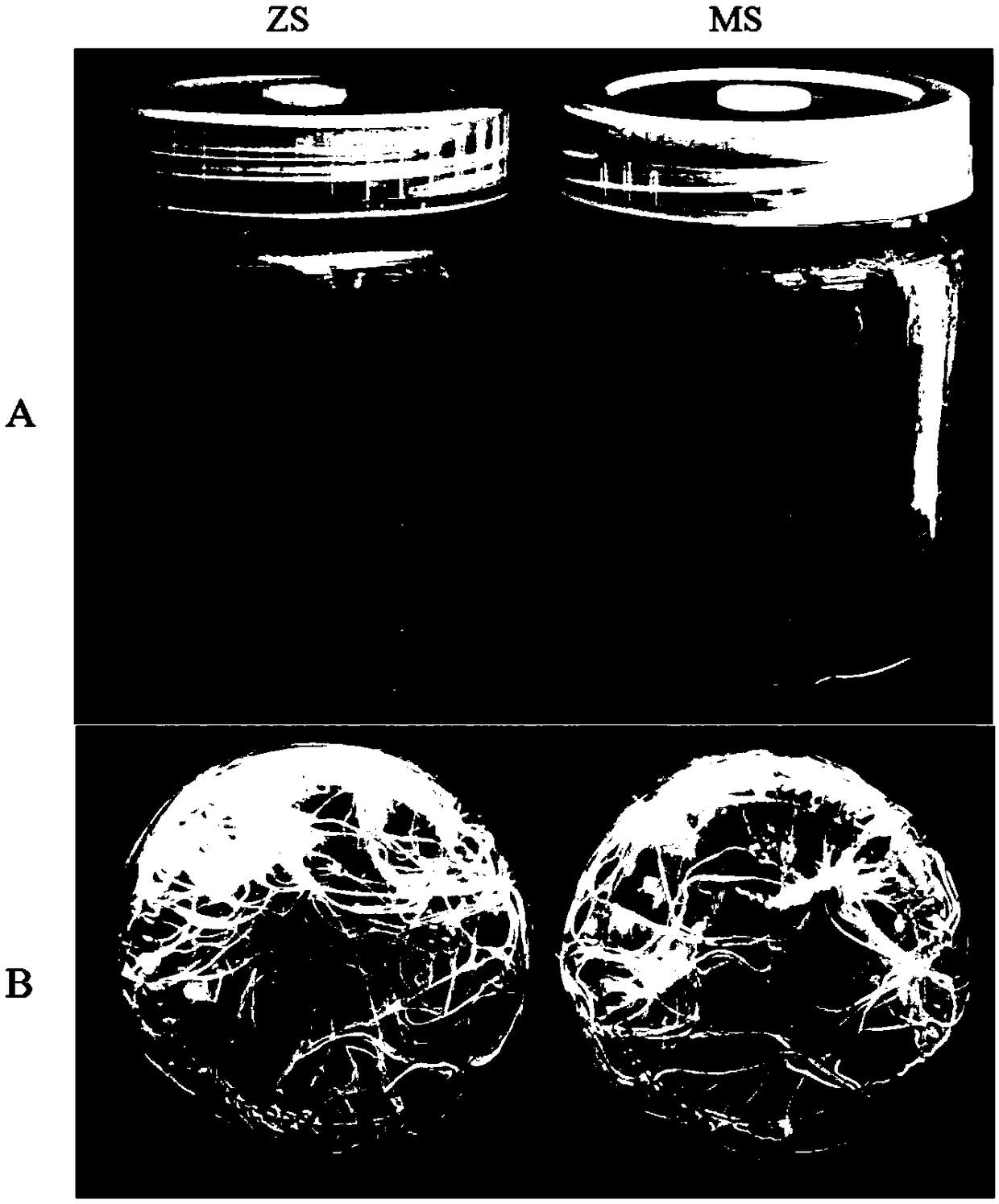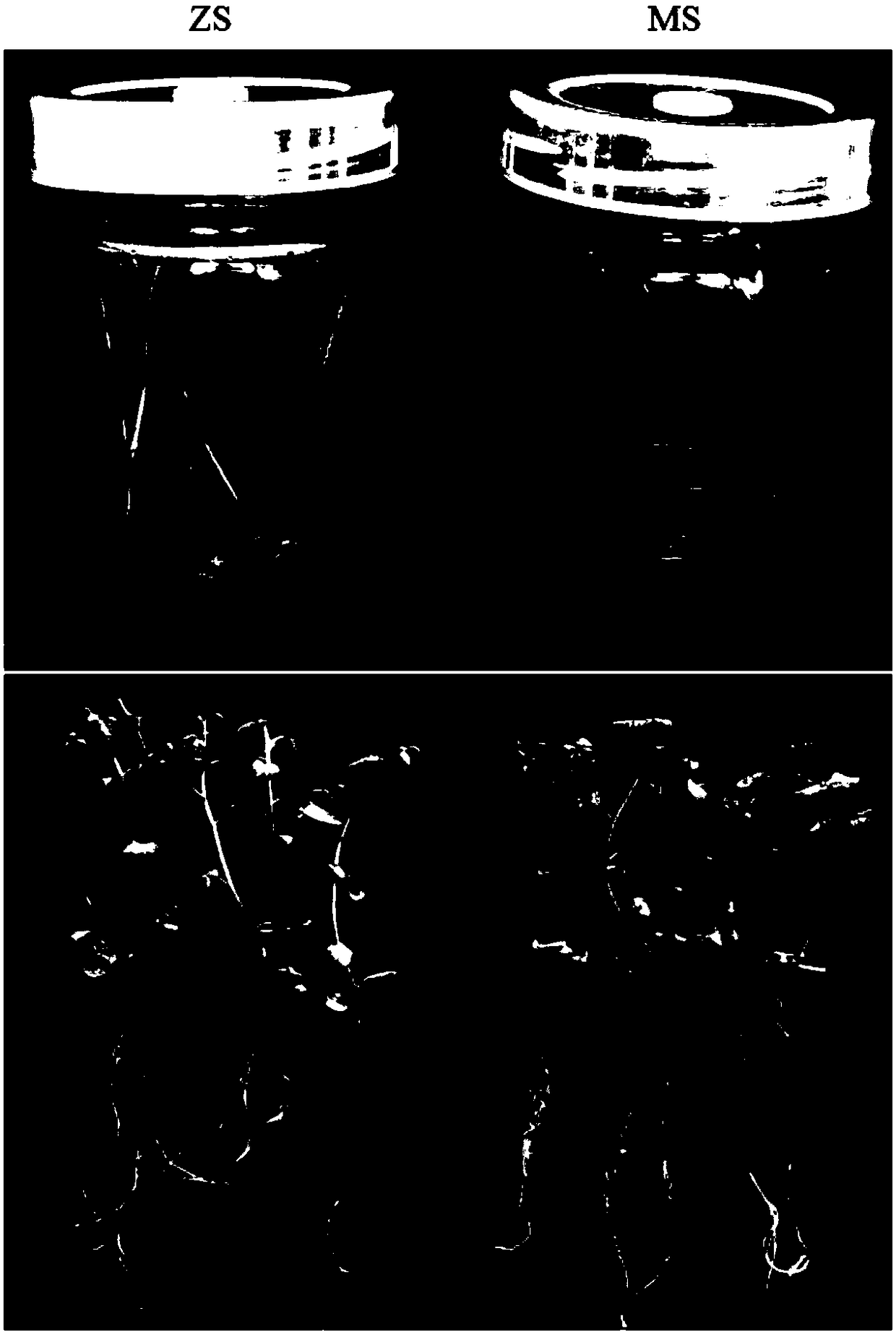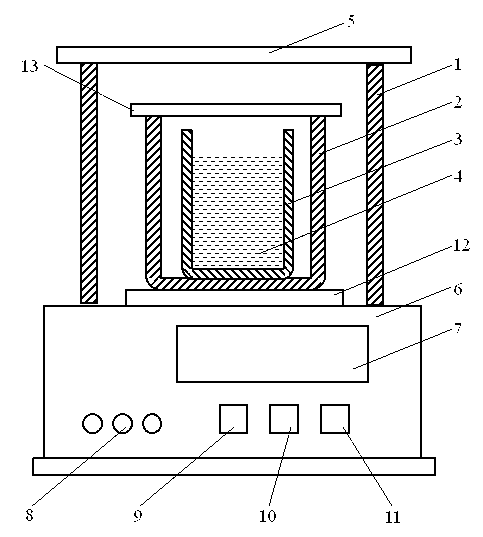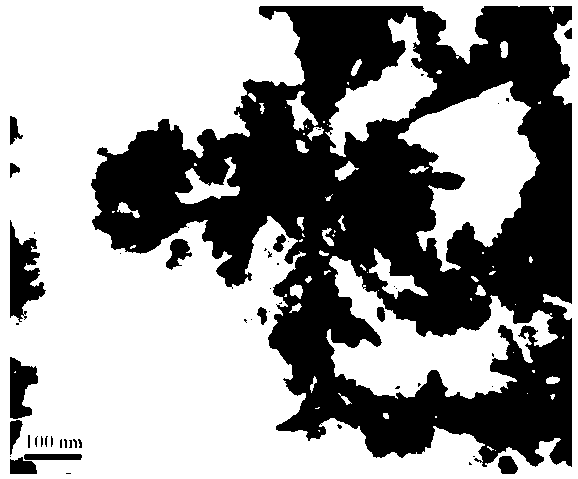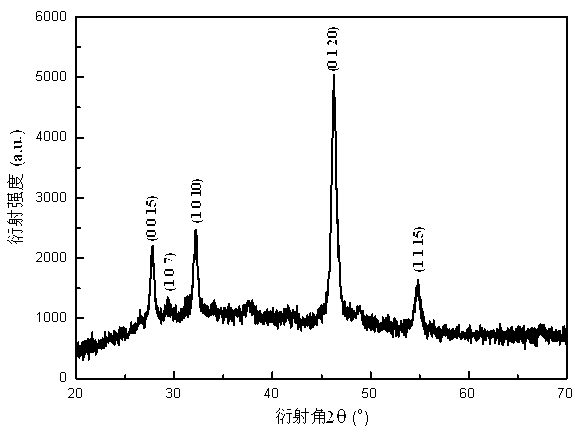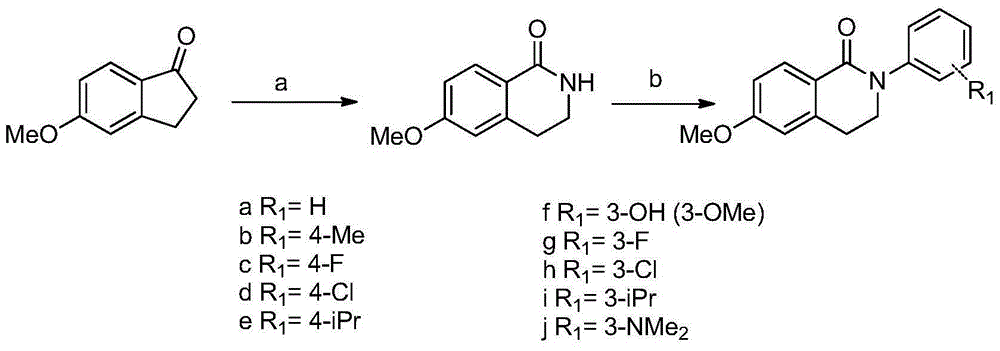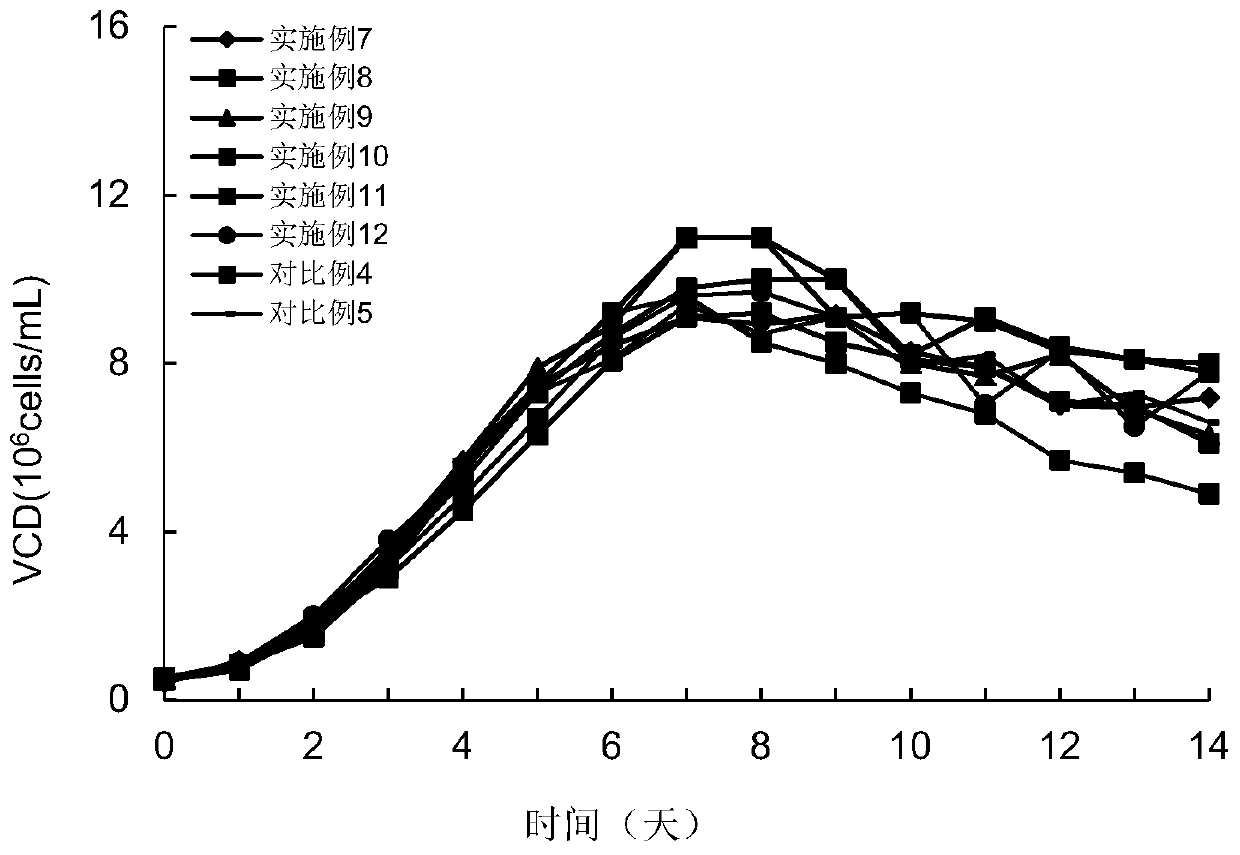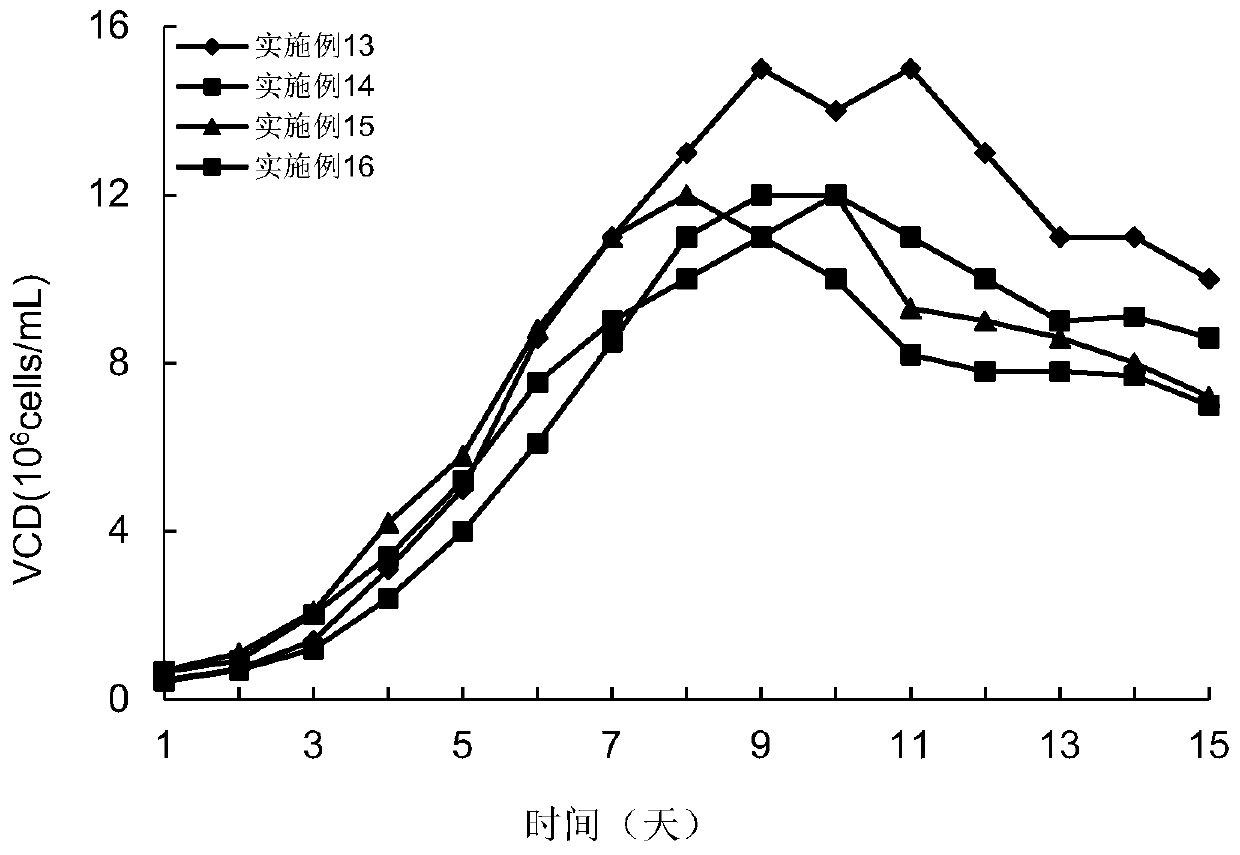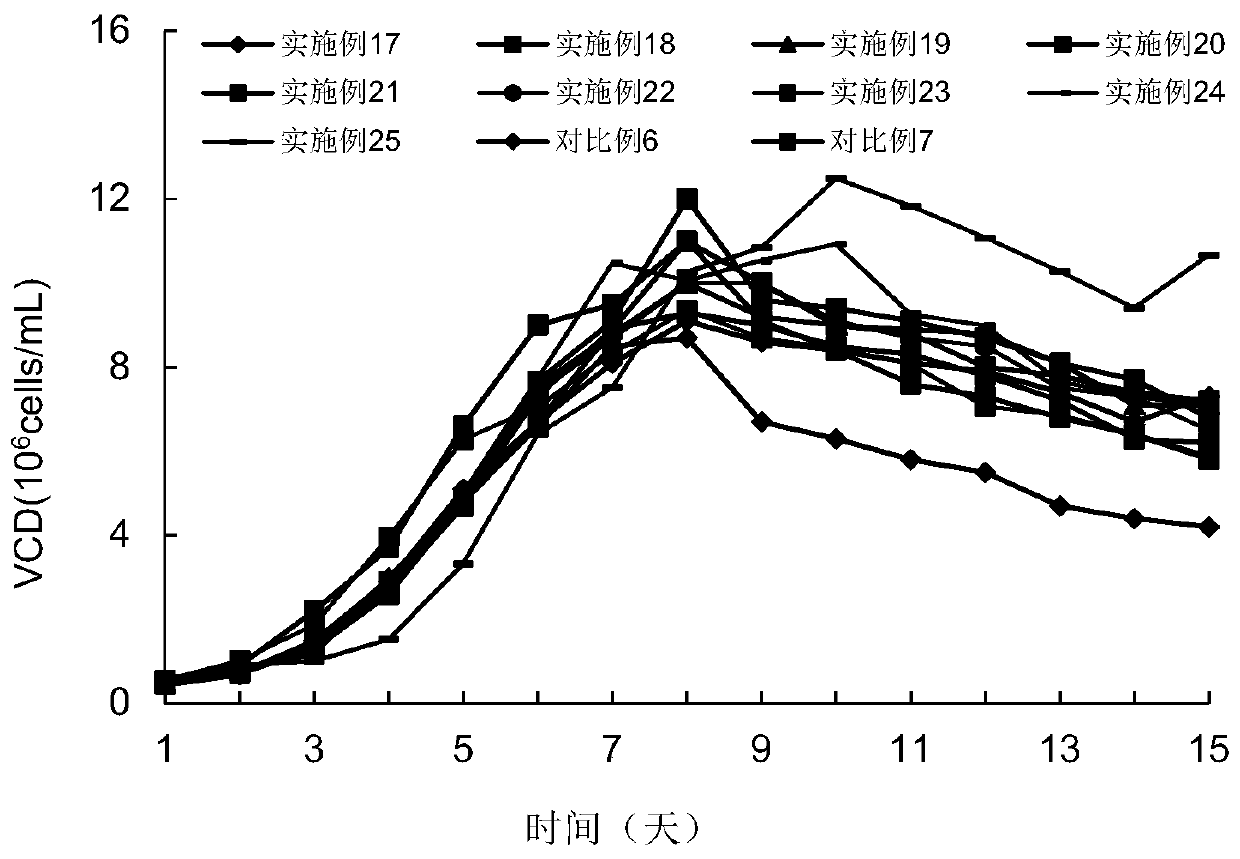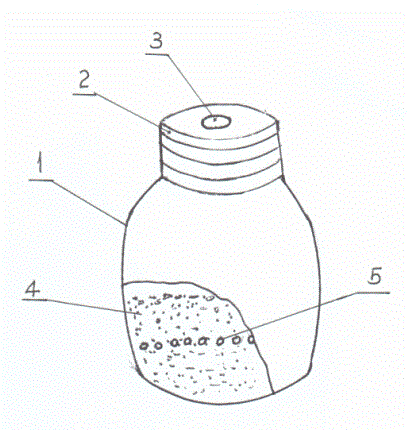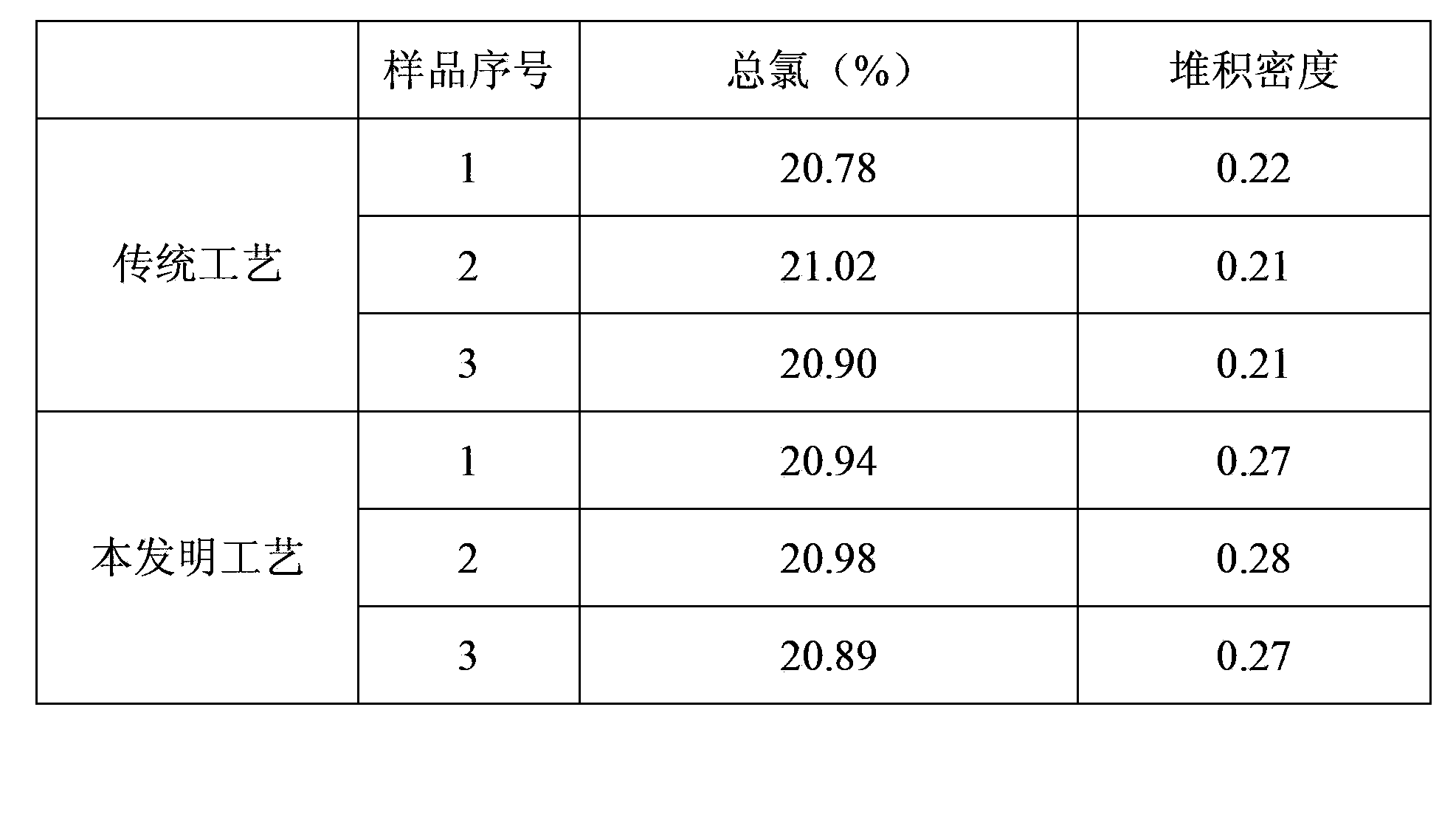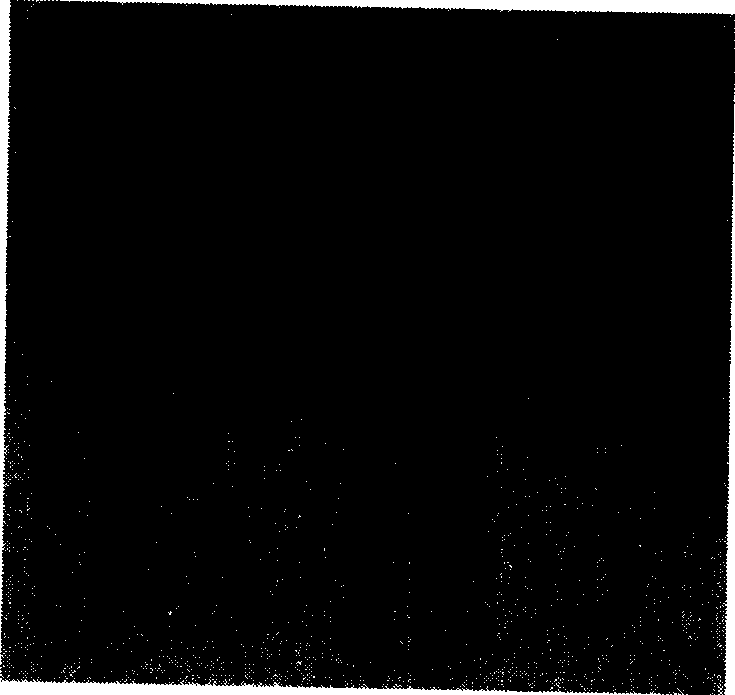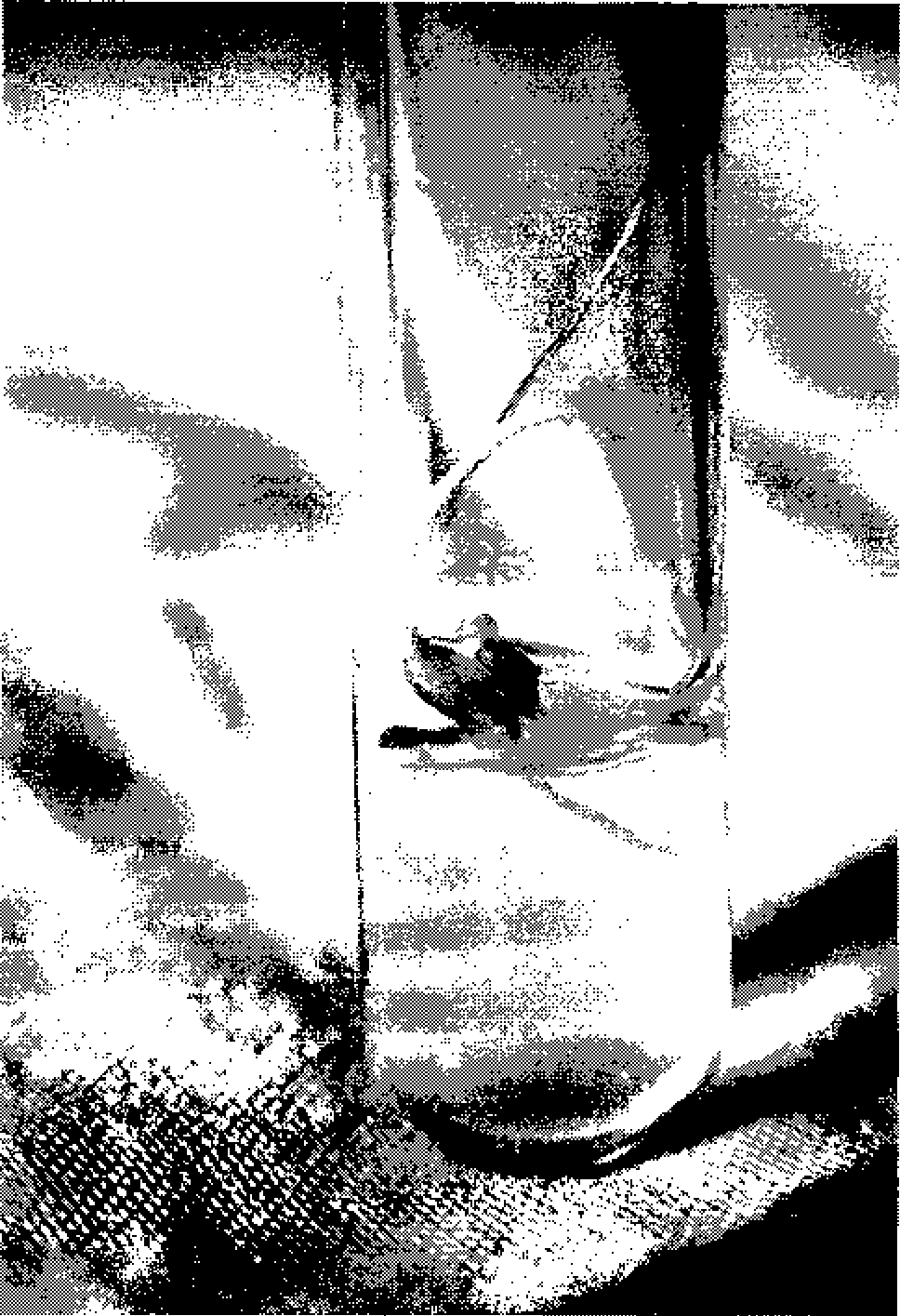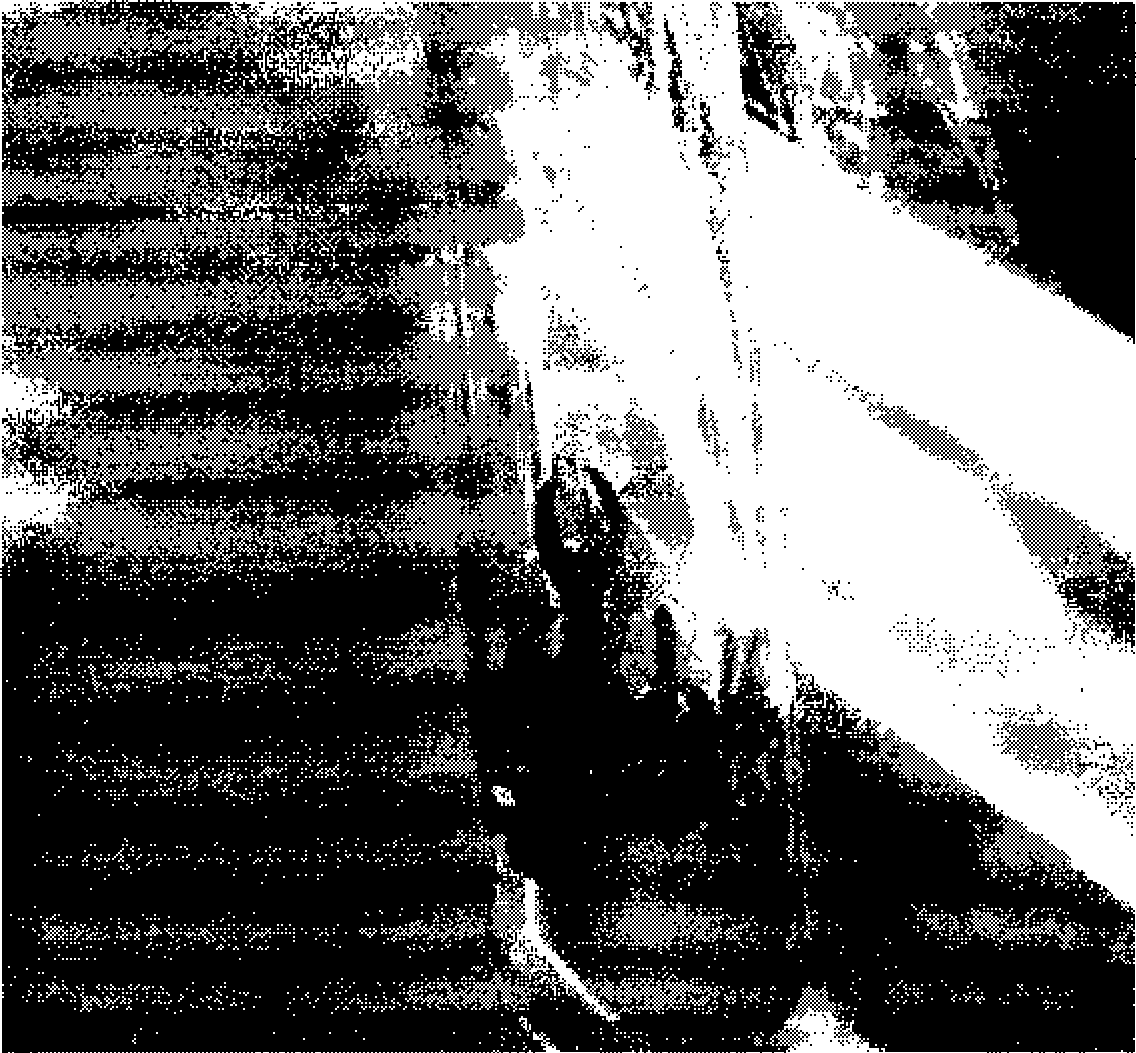Patents
Literature
254 results about "Thiamine Hydrochloride" patented technology
Efficacy Topic
Property
Owner
Technical Advancement
Application Domain
Technology Topic
Technology Field Word
Patent Country/Region
Patent Type
Patent Status
Application Year
Inventor
Thiamine Hydrochloride is the hydrochloride salt form of thiamine, a vitamin essential for aerobic metabolism, cell growth, transmission of nerve impulses and acetylcholine synthesis.
Dietetic food composition for losing weight
ActiveCN103719852AControl intakeControl ingredientSugar food ingredientsFood ingredient functionsBiotechnologyVegetable oil
The invention discloses a dietetic food composition for losing weight. The composition comprises the following ingredients: fresh meat and aquatic product, vegetables, fruits, dried mushroom products, cereals, beans, nut meat, edible vegetable oil, eggs, protein hydrolysate powder, dietary fiber powder, konjac powder, guar gum, polyols, phosphatidylcholine, fruit polyphenols, L-carnitine, vitamin A, vitamin E, vitamin C, thiamine hydrochloride, riboflavin, nicotinamide, pyridoxine hydrochloride, folic acid, cyanide-containing cobalt and pantothenic acid. By adopting the dietetic food composition disclosed by the invention, the total energy intake is reduced under the premise of ensuring normal basic metabolic rate, the requirements of the body on protein at a low-energy diet period are improved, and related nutrients are replenished to facilitate body fat, visceral fat and blood lipid metabolism, so as to achieve the target of losing weight. Meanwhile, the invention also discloses a preparation method of the dietetic food composition and use of the dietetic food composition in preparation of a medicament for preventing or treating an obesity disease.
Owner:GUANGZHOU CINJEP BIOTECH
Composition for the treatment of hair loss and baldness
InactiveUS20110070315A1Good conditionImprove hair growthBiocideCosmetic preparationsArginineThiamine hcl
A synergistic composition, or the use of that composition in the manufacture of a medicament, or a method of treatment including the use of that composition, for the treatment of hair loss and baldness, for combined, sequential or simultaneous administration, in any form, via any biological route. In its optimal embodiment the composition consists, in the form of a lotion: 1600-2400 IU / mL Vitamin A Palmitate, 0.64%-0.96% Thiamine Hydrochloride, 0.64%-0.96% Pyridoxine Hydrochloride, 4.8%-7.2% Niacinamide, 2.85%-5.2% D-Panthenol, 1.6%-2.4% L-Arginine, 3.6%-4.4% Methyl Sulphonyl Methane (MSM), 0.08%-0.12% Ginger Oil, 0.08%-0.12% Cinnamon Oil, 0.0996%-0.1494% Oleoresin Capsicum, 1.3%-1.95% Magnesium, 2.4%-3.6% Zinc, 0.192%-0.288% Manganese, 2.6%-3.9% Urea, 2.4%-3.6% Sodium Glycerophosphate, 4.8%-7.2% L-Lysine HCl, plus Preservatives, Co-solvent (Propylene Glycol), Fragrances, Anti-Oxidant, Cooling agent (Menthol), Emulsifier, and Vehicle (Purified water).
Owner:TAYLOR AS +2
Compound vitamin tablets and preparation method thereof
ActiveCN105410943AFull of nutritionThe ingredients are well matchedFood sciencePolythylene glycolPyrrolidinones
The invention belongs to the field of healthcare products and particularly relates to compound vitamin tablets and a preparation method thereof. Each compound vitamin tablet provided by the invention comprises a tablet core and a film coating layer, wherein the tablet core is mainly prepared from vitamin A acetate, sodium ascorbate, DL-alpha-tocopheryl acetate, nicotinamide, calcium pantothenate, thiamine hydrochloride, riboflavin, pyridoxine hydrochloride, folic acid, D-biotin, zinc oxide, sodium selenite, pre-gelatinized starch, maltodextrin, microcrystalline cellulose and silicon dioxide; and the film coating layer is mainly prepared from hydroxypropyl methyl cellulose, polyethylene glycol 4000, polyvinylpyrrolidone, titanium dioxide, castor oil and water. The compound vitamin tablets provided by the invention have the advantages of high safety and abundant nutrition and can provide the vitamins and minerals necessary for pregnant women so as to enhance immunity; meanwhile, the compound vitamin tablets can effectively reduce the abortion rate of pregnant women and oaf incidence; and therefore, the compound vitamin tablets are a perfect compound vitamin product for pregnant women.
Owner:富诺健康股份有限公司
Method for increasing breeding efficiency of wild rice and cultivated rice distant hybridization embryo rescue
InactiveCN104871964ANot hurtImprove survival ratePlant tissue cultureHorticulture methodsAgricultural scienceThiamine hcl
The invention discloses a method for increasing breeding efficiency of wild rice and cultivated rice distant hybridization embryo rescue, belongs to the field of breeding by the biological technique, and aims at reducing the alcohol disinfecting time and reducing the alcohol concentration as well as creating foundation for the survival rate of hybridization seedlings. The method is that the MS of an embryo culture is improved; the concentration of KNO3, NH4NO3, KH2PO4 and MnSO4.4H2O is reduced; meanwhile, CuSO4.5H2O, CoCl2.6H2O, niacin, pyridoxine hydrochloride and thiamine hydrochloride are not added; the hardening-seedling technology is innovated; when in hardening seedling of the plants, the hardening-seedling treatment with convenient operation and good effect is carried out, so that the survival rate of the seedlings can be greatly increased. According to the operation of the method, the operation of embryo rescue is simplified; the whole culture costs 30 days only, so that the culture cycle can be greatly reduced; meanwhile, the seedling rate can be greatly increased and up to 94%; therefore, the breeding efficiency of the wild rice and cultivated rice distant hybridization embryo rescue can be increased.
Owner:云南省农业科学院生物技术与种质资源研究所
Leaf fertilizer for preventing and treating fruit cracking of red jujube and preparing method thereof
InactiveCN107337513AEasy to prepareEasy to storeCalcareous fertilisersMagnesium fertilisersNiacinAmmonium nitrate
The invention discloses a leaf fertilizer for preventing and treating fruit cracking of red jujube. The leaf fertilizer is prepared from, by mass, 38-42% of potassium nitrate, 33-36% of ammonium nitrate, 7-8% of magnesium sulfate, 3-4% of mono potassium phosphate, 8.5-10% of anhydrous calcium chloride, 0.7-0.85% of ethylene diamine tetraacetic acid, 0.5-0.65% of ferrous sulfate heptahydrate, 1.5-2.5% of inositol, 0.04-0.05% of glycine, 0.001-0.003% of thiamine hydrochloride, 0.005-0.15% of pyridoxine hydrochloride and 0.005-0.02% of niacin, and the mass sum of components is 100%. The leaf fertilizer for preventing and treating the fruit cracking of the red jujube contains nutrient elements such as potassium, phosphorus, nitrogen, calcium and magnesium, through reasonable matching, the toughness of the red jujube is improved, accordingly, the fruit cracking of the red jujube is avoided, and the weight of the red jujube is increased. The preparing method of the leaf fertilizer for preventing and treating the fruit cracking of the red jujube is easy.
Owner:YANAN UNIV
Goose liver essence and preparation method thereof
The invention discloses a goose liver essence and a preparation method of the goose liver essence. The goose liver essence comprises the following components by weight ratio: 40-60 parts of goose liver enzyme hydrolysis solution, 1-10 parts of reducing sugar, 1-15 parts of amino acid, 0.1-1.5 parts of thiamine hydrochloride, 0.1-5 parts of disodium 5'-ribonucleotide, 0.1-5 parts of spice powder and 30-45 parts of hydrolyzed vegetable protein solution. The goose liver essence is prepared from the goose liver enzyme hydrolysis solution as well as the reducing sugar, the amino acid, the thiamine hydrochloride, the disodium 5'-ribonucleotide, the spice powder and the hydrolyzed vegetable protein solution through Maillard reaction, wherein the goose liver enzyme hydrolysis solution serves as the main raw material, and the reducing sugar, the amino acid, the thiamine hydrochloride, the disodium 5'-ribonucleotide, the spice powder and the hydrolyzed vegetable protein solution serve as the auxiliary raw materials. Therefore, the prepared product has strong real goose liver characteristic aroma, mellow taste and high nutritional value and can be widely used as the essence of instant noodle seasonings, food ingredients and meat products.
Owner:广州百花香料股份有限公司
Culture medium for spore germination and seedling culturing of pteridophyte
InactiveCN101911914AImprove germination rateHigh induction rateHorticulture methodsPlant tissue cultureSpore germinationPteridophyte
The invention belongs to the technical field of biological engineering, and relates to a culture medium for the spore germination and seedling culturing of pteridophyte, which is characterized by consisting of the following nutritional components: 2 to 60 mmol.L<-1> nitrate ions, 1 to 30 mmol.L<-1> ammonium ions, 0.3 to 8 mmol.L<-1> phosphate radical ions, 2.7 to 66 mmol.L<-1> potassium ions, 0.37 to 12.0 mmol.L<-1> calcium ions, 0.18 to 1.8 mmol.L<-1> magnesium ions, 0.173 to 1.73 mmol.L<-1> sulfate ions, 10 to 100 mumol.L<-1> chelated ferric salt or chelated ferrous salt, 10 to 200 mumol.L<-1> boric acid, 10 to 100 mumol.L<-1> divalent manganese ions, 3 to 30 mumol.L<-1> zinc ions, 0.5 to 8 mumol.L<-1> divalent copper ions or complexes thereof, 0.1 to 1 mumol.L<-1> molybdate ions, 0.01 to 0.1 mumol.L<-1> divalent cobalt ions, 0.05 to 12 mumol.L<-1> chloride ions, 0.3 to 30 mumol.L<-1> thiamine hydrochloride and the balance of water, wherein the pH value of the culture medium is between 4.0 and 9.0. The culture medium can improve the germination rate of spores.
Owner:CHINA UNIV OF GEOSCIENCES (WUHAN)
Culture medium of germination of orchid seed
InactiveCN101352117AShorten germination timeImprove germination rateSeed and root treatmentCultivating equipmentsGlycineOrchis
The invention discloses a medium for the seed germination of orchids; the medium consists of NH4NO3, KNO3, CaCl2.2H2O, MgSO4.7H2O, KH2PO4, KI, H3BO3, MnSO4.4H2O, ZnSO4.7H2O, Na2MoO4.2H2O, CuSO4.5H2O, CoCl2.6H2O, FeSO4.7H2O, Na2.EDTA, inosite, nicotinic acid, pyridoxine hydrochloride, thiamine hydrochloride, glycine, peptone from casein, mashed potato and sucrose and the volume is limited by water; by using the medium of the invention to culture orchid, not only the seed germination time can be shortened but also the seed germination rate can be improved; the experiment indicates that by using the medium of the invention to culture orchid, only two weeks are needed from seeding to germination and the germination rate is more than 70 percent. The method of the invention is suitable for culturing various caulicolous orchids and has the advantages of simple operation and low cost; therefore, the medium and the method for culturing the orchids of the invention have important promotion value and are applicable to practice use.
Owner:INST OF BOTANY CHINESE ACAD OF SCI
Method for preparing serum-free soybean protein peptide animal cell medium
InactiveCN101914485ASave the cultivation cycleSave distractionsVertebrate cellsArtificial cell constructsCell culture mediaL-Glutamin
The invention discloses a method for preparing a serum-free soybean protein peptide animal cell medium, and relates to a serum-free or low-serum collective cell medium. The serum-free soybean protein peptide animal cell medium is prepared from calcium chloride, potassium chloride, anhydrous magnesium sulfate, sodium chloride, anhydrous sodium dihydrogen phosphate, L-glutamine, D-glucose, phenol red, D-calcium pantothenate, choline chloride, folic acid, i-inositol, niacinamide, pyridoxal hydrochloride, lactoflavin, thiamine hydrochloride, soybean protein peptide and distilled water. The method of the invention solves the problem that the conventional serum-free medium cannot be directly used for cultivating cells in the poor growth condition, and a large number of the cells can adapt to the conventional serum-free medium only when the serum concentrations thereof are gradually reduced, and the cells are easily affected by external factors, so fatal damages are easily caused. The method of the invention has the advantages that the cells can directly be cultivated in the medium of the invention without gradual domestication and cultivation, so the culture period of the cell is shortened and the interference of other factors is avoided; meanwhile, the virus pollution brought by serums is reduced, and the survival rate of the cells is over 94 percent.
Owner:乐能生物工程股份有限公司
Culture medium for bletilla striata tissue culture
ActiveCN105052752AIncrease concentrationLarge bulbPlant tissue cultureHorticulture methodsBletilla striataThiamine hcl
The invention provides a culture medium for bletilla striata tissue culture. The culture medium consists of improved MS culture medium: 1890mg / L to 1900mg / L of potassium nitrate, 1650mg / L to 1660mg / L of ammonium nitrate, 440mg / L to 445mg / L of CaCl2.2H2O, 370mg / L to 375mg / L of magnesium sulfate heptahydrate, 165mg / L to 170mg / L of monopotassium phosphate, 0.75mg / L to 0.83mg / L of KI, 0.025mg / L to 0.03mg / L of cobalt chloride, 27.8mg / L to 30mg / L of ferrous sulfate, 24.3mg / L to 26mg / L of ethylenediaminetetraacetic acid, 95mg / L to 100mg / L of inositol, 0.8mg / L to 1mg / L of niacin, 0.8mg / L to 1mg / L of pyridoxine hydrochloride, 0.8mg / L to 1mg / L of thiamine hydrochloride and 3mg / L to 4mg / L of glycine. Bletilla striata grown by the culture medium has the characteristics of strong roots, big corms, less variation phenomenon, high transplanting survival rate and fast growth.
Owner:康美药业(昆明)种质资源有限公司
Non-blood serum plant protein peptide universal cell culture medium
InactiveCN101245335AReduce distractionsImprove survival rateVertebrate cellsArtificial cell constructsCell culture mediaCulture mediums
A serum-free vegetable protein peptide general cell culture medium relates to a serum-free or low-serum general cell culture medium. The serum-free vegetable protein peptide general cell culture medium solves the problems that the existing serum-free culture medium can not directly culture the cells with adverse growth status, most of cells can be adaptable to the existing serum-free culture medium after the gradual reduction of the serum concentration, and the existing serum-free culture medium is vulnerable to the external factors and easy to cause fatal damage. The serum-free vegetable protein peptide general cell culture medium is prepared by calcium chloride, potassium chloride, magnesium sulfate anhydrous, sodium chloride, anhydrous sodium dihydrogen phosphate, L-glutamine, D-glucose, phenol red, D-calcium pantothenate, choline chloride, folic acid, i-inositol, nicotinamide, pyridoxal hydrochloride, riboflavin, thiamine hydrochloride, soybean protein peptide and distilled water. Cells can be directly cultured on the culture medium of the invention without gradual habituation and culture, thus shortening culture period and avoiding the interference by other factors, reducing the virus pollution which is caused by serum; the cell survival rate reaches more than 94 percent.
Owner:乐能生物工程股份有限公司
Proliferation medium for Sierra cowberry blueberry tissue culture and preparation method thereof
ActiveCN104082142AIncreased nitrate nitrogen contentShorten the growth cycleHorticulture methodsPlant tissue cultureSucroseBoronic acid
The invention discloses a proliferation medium for Sierra cowberry blueberry tissue culture. 1L of the proliferation medium comprises modified WPM (woody plant medium), 0.5mg of NAA (Naphthalene Acetic Acid), 0.2mg of GA, 2-3mg of zeatin (ZT), 30g of saccharose, and 7g of agar, and has pH value of 5.2. 1L of the modified WPM contains macroelements, iron salts, microelements and organic substances, wherein the macroelements comprise 893mg of potassium nitrate, 119mg of ammonium sulfate, 370mg of magnesium sulfate, 278mg of calcium nitrate tetrahydrate, and 170mg of monopotassium phosphate; the ferric salts comprise 74.6mg of ethylene diamine tetraacetic acid, and 55.6mg of ferrous sulfate; the microelements comprise 22.3mg of manganese sulfate, 8.6mg of zinc sulfate, 0.025mg of copper sulfate, 0.25mg of sodium molybdate, 6.2mg of boric acid, 0.415mg of potassium iodide; and the organic substances comprise 0.5mg of niacin, 0.5mg of thiamine hydrochloride, 0.5mg of pyridoxine hydrochloride, 100mg of inositol and 2mg of glycine. The proliferation rate can reach more than 12 after the medium is used for 30 days.
Owner:JIANGSU POLYTECHNIC COLLEGE OF AGRI & FORESTRY
Basic medium for plant tissue culture
ActiveCN108812313AReduce usageImprove securityPlant tissue cultureHorticulture methodsPhosphateThiamine hcl
The invention discloses a basic medium ZS for plant tissue culture and relates to the field of plant propagation. Every 1000 mL of the basic medium ZS contains 3075 mg of potassium nitrate, 578 mg ofammonium phosphate, 491 mg of calcium nitrate, 160 mg of ammonium chloride, 222 mg of magnesium nitrate, 396 mg of ammonium sulfate, 0.83 mg of potassium iodide, 6.2 mg of boric acid, 22.3 mg of manganese sulfate, 8.6 mg of zinc sulfate, 0.25 mg of sodium molybdate, 0.025 mg of copper sulfate, 0.025 mg of cobalt chloride, 100 mg of inositol, 0.1 mg of thiamine hydrochloride (VB1), 0.5 mg of pyridoxine hydrochloride (VB6), 0.5 mg of nicotinic acid, 37.3 mg of ethylenediaminetetraacetic acid disodium salt and 27.8 mg of ferrous sulfate. By means of the basic medium, the same tissue culture effect as an MS medium can be obtained without ammonium nitrate.
Owner:SHANDONG AGRICULTURAL UNIVERSITY +1
Preparation method of dendritic copper sulphide microcrystal
The invention relates to a preparation method of a dendritic copper sulphide microcrystal. According to the preparation method, cupric nitrate and thiamine hydrochloride serving as raw materials, deionized water serving as a solvent, and a preparing solution are subjected to hydro-thermal synthesis in a reaction kettle, and then are centrifugally separated, washed, extracted and filtered, and dried in vacuum to obtain a dendritic copper sulphide microcrystal product. The preparation method adopts the thiamine hydrochloride as a sulfur source, thus the dendritic copper sulphide microcrystal is green and nontoxic; and due to that the preparation process is advanced and reasonable, the data are full and accurate, the product has high purity up to 98%, the yield is high and up to 90%, no pollution is brought to the environment, the method is an ideal method for preparing the dendritic copper sulphide microcrystal.
Owner:TAIYUAN UNIV OF TECH
Culture medium for tissue culture of devirused potato and its prepn
InactiveCN1348990AReduce manufacturing costRapid Factory BreedingPlant tissue cultureHorticulture methodsGlycineMicrobiology
This invention provides a virus-removed culture medium for group culture of potato and its composition includes (g / l): macro-elements: one or several of NH4NO3 1650 mg / l, KNO3 1900 mg / l, CaCl2.4H2O 440 mg / l, MgSO4.7H2O 370 mg / l and KH2PO4 170 mg / l; micro-elements: one on several of KI 0.38 mg / l, H2BO3 6.2 mg / l, MnSO4.4H2O 22.3 mg / l, ZnSO4.4H2O 8.6 mg / l, NaMoO4.2H2O 0.25 mg / l, CuSO4.5H2O 0.025 mg / l, CoCl2.6H2O 0.025 mg / l and FeSO4.7H2O 37.3 mg / l; complexing agent Na2.EDTA.2H2O 27.8 mg / l; organic componnets: one or several of inositol 100 mg / l, nicotinic acid 0.5 mg / l, pyridoxol hydrochloride 0.5 mg / l, thiamine hydrochloride 0.1 mg / l and glycine 2 mg / l; cane sugar 30 g / l, starch 60-70 g / l and water the rest. Use of the said culture medium can greatly lower the production cost of group culturing of potato seedling and make the quick factorized breeding of potato group cultured seedling become possible.
Owner:SHIJIAZHUANG INST OF AGRI MODERNIZATION CHINESE ACAD OF SCI
Method for growing selenium-enriched water spinach
InactiveCN107926675ALess likely to spreadSimple and fast operationMagnesium fertilisersAlkali orthophosphate fertiliserSucrosePhosphate
The invention discloses a method for growing selenium-enriched water spinach. A water culture method is adopted, ammonium nitrate, potassium nitrate, calcium chloride, magnesium sulfate, potassium dihydrogen phosphate, boric acid, manganese sulfate, zinc sulfate, sodium molybdate, sodium selenate, copper sulfate, ferrous sulfate, disodium ethylenediaminetetraacetate, sodium selenite, glycine, thiamine hydrochloride, pyridoxine hydrochloride, niacin, inositol, folic acid, biotin, sucrose and agar are utilized to prepare a culture medium, and tubers are inserted into the culture medium for proliferation. Nutrient solution is supplemented during the growth of the water spinach to meet the requirements of various growth stages of the water spinach, thereby obtaining the high-yield and high-quality selenium-enriched water spinach.
Owner:FOSHAN TUIQI AGRI RES INST GENERAL PARTNERSHIP
Culture medium for delaying growth of potato tissue cultured seedlings
InactiveCN103875537APromote growthGrow vigorouslyHorticulture methodsPlant tissue cultureThiamine hclMonopotassium phosphate
The invention discloses a culture medium for delaying the growth of potato tissue cultured seedlings. Every 1L of the culture medium comprises the following components: 627mg-693mg of ammonium nitrate (NH4NO3), 722mg-798mg of potassium nitrate (KNO3), 168mg-184mg of calcium chloride (CaCl2.2H2O), 160mg-176mg of magnesium sulfate (MgSO4.7H2O), 65mg-71mg of monopotassium phosphate (KH2PO4), 0.315mg-0.348mg of potassium iodide (KI), 2.36mg-2.60mg of boric acid (H3BO3), 6.43mg-7.09mg of manganese sulfate (MnSO4.4H2O), 3.27mg-3.61mg of zinc sulfate (ZnSO4.7H2O), 0.095mg-0.105mg of sodium molybdate (Na2MoO4.2H2O), 0.009mg-0.011mg of copper sulfate (CuSO4.5H2O), 0.009mg-0.011mg of cobalt chloride (CoCl2.6H2O), 28.5mg-31.5mg of ferric sodium edelate (FeNa2EDTA.H2O), 38mg-42mg of inositol (C6H12O6), 0.19mg-0.21mg of nicotinic acid (C6H5NO2), 0.19mg-0.21mg of pyridoxine hydrochloride (C8H11NO3.HCl), 0.038mg-0.042mg of thiamine hydrochloride (C12H17ClN4OS.HCl), 7600mg-8400mg of cane sugar (C12H22O11), 7600mg-8400mg of mannitol, 6650mg-7350mg of agar and the balance of water. By adopting the culture medium disclosed by the invention, the potato tissue cultured seedlings grow slowly and need 140-150 days to grow to a height of 8cm since the inoculation date, thus the preservation time of the potato seedlings is remarkably prolonged.
Owner:YUNNAN AGRICULTURAL UNIVERSITY
Method for synthesizing isoquinoline ketone compounds
The invention discloses a method for synthesizing isoquinoline ketone compounds. The method includes that dual-core salicylic acid copper complexes which are cheap and easy to synthesize are taken as catalyzers, oxygen which is green, environment-friendly and nontoxic is taken as an oxidizing agent, chlorine salt, 3-benzyl-5-(2-hydroxy ethyl) -4-methyl thiazole moiety or thiamine hydrochloride are taken as auxiliary catalizers, and 2-aryl-1,2,3,4-tetrahydroisoquinoline compounds are subjected to further reaction to obtain the isoquinoline ketone compounds. The method is simple in operation, the catalyzers are cheap and easy to obtain, reaction conditions are moderate, product yield is high, shortcomings that traditional raw material reagents are high in price, harsh in condition, complex in synthesizing step, low in overall yield and the like are overcome, and good application prospect is achieved.
Owner:SHAANXI NORMAL UNIV
Culture medium for phalaenopsis amabilis tissue culture
The invention provides a culture medium for phalaenopsis amabilis tissue culture. The culture medium comprises the following components: 1900 mg / L of KNO3; 1650 mg / L of ammonium nitrate; 170 mg / L of potassium dihydrogen phosphate; 370 mg / L of magnesium sulfate heptahydrate; 440 mg / L of calcium chloride dihydrate; 0.60-0.62 mg / L of KI; 4.5-4.8 mg / L of boric acid; 25.0-25.3 mg / L of manganese sulfate tetrahydrate; 7.0-7.2 mg / L of zinc sulfate heptahydrate; 0.20-0.22 mg / L of sodium molybdate dihydrate; 0.025 mg / L of copper sulfate pentahydrate; 0.025 mg / L of cobalt chloride hexahydrate; 37.25 mg / L of Na2.EDTA; 27.85 mg / L of ferrous sulfate heptahydrate; 100 mg / L of inositol; 2 mg / L of glycine; 0.1 mg / L of thiamine hydrochloride; 0.5 mg / L of pyridoxine hydrochloride; 0.5 mg / L of nicotinic acid; 20-22 g / L of sucrose; 5-5.2 g / L of agar; 30-35 g / L of a banana juice; 3-5 g / L of a pear juice; 0.45-0.48 g / L of activated carbon; and a solvent being deionized water. With application of the culture medium to culture phalaenopsis amabilis, the survival rate is more than 96%, the bacteria infection rate is 2.7-2.8%, and the browning degree of the culture medium is 30-40% lower than that of an MS culture medium.
Owner:柳州赛特生物科技研发中心
Supplementing culture medium for CHO cell culture and preparing method and application thereof
ActiveCN110343666APromote growthGuaranteed survival rateGenetically modified cellsCulture processThiamine hclTryptophan
The invention relates to a supplementing culture medium for CHO cell culture and a CHO cell culture method. The supplementing culture medium comprises amino acids, vitamins, sodium hydroxide and waterfor injection. According to the total mass of the supplementing culture medium, the supplementing culture medium comprises, by mass, 4.8-19.75% of amino acids, 0.00925-0.13% of vitamins, 1.25-5.5% ofsodium hydroxide and the balance water for injection, wherein the amino acids include L-aspartic acid, L-tyrosine, L-threonine, L-tryptophan and L-glutamic acid, and the vitamins include riboflavin,folic acid, vitamin B12, biotin, menadione sodium bisulfite, thiamine hydrochloride and L-ascorbic acid. By means of the supplementing culture medium and the cell culture method, CHO cell growth can be optimized, and the capacity of cells of expressing target protein can be improved.
Owner:TONGHUA DONGBAO PHARMA
Dendrobium candidum sprouting and rooting culture medium, and preparation method and cultivation method thereof
InactiveCN104351052AIncrease costMeet production needsHorticulture methodsPlant tissue cultureThiamine hclContamination rate
The invention belongs to a dendrobium candidum sprouting and rooting culture medium, and a preparation method and a cultivation method thereof. The culture medium is characterized by comprising potassium nitrate, ammonium nitrate, monopotassium phosphate, magnesium sulphate, calcium chloride, potassium iodide, boric acid, manganese sulfate, zinc sulfate, sodium molybdate, cupric sulfate, cobaltous chloride, disodium EDTA, ferrous sulfate, phaseomannite, glycine, thiamine hydrochloride, pyridoxine hydrochloride, nicotinic acid, cane sugar, agar and distilled water by weight. The invention solves the technical problem of extremely low natural fertility, as well as increase of contamination rate and high cost of the culture medium, which are caused by twice manual transplanting and cultivating. The dendrobium candidum of the sprouting and rooting two-in-one culture medium can meet the demands of both production and people.
Owner:DALIAN LONGFENGXIANG ECOLOGICAL AGRI SCI & TECH
Whey protein solid beverage
InactiveCN107258927AHigh organic ferrous contentPromote decompositionWhey manufactureSolubilityAdditive ingredient
The invention discloses a whey protein solid beverage. The whey protein solid beverage is prepared from the following raw materials: concentrated whey protein powder, inulin, resistant dextrin, a flavoring agent, vitamin A acetate, vitamin C, vitamin E acetate, thiamine hydrochloride, riboflavin, pyridoxine hydrochloride, vitamin B12, folic acid, calcium pantothenate, ferrous fumarate, zinc sulfate, maltodextrin, natural strawberry essence, silicon dioxide and stevioside. According to the whey protein solid beverage disclosed by the invention, the raw materials have high protein content and contain various types of vitamins, so that the absorption of proteins can be accelerated, the water solubility is relatively high and the mouthfeel is more fine and smooth. The whey protein solid beverage disclosed by the invention has the effects of supplementing physical ability, nutrients and various types of the vitamins, protecting eyesight and the like. The whey protein solid beverage has simple and reasonable raw material composition, natural components and a proper proportion; when being brewed with water, the whey protein solid beverage is more uniformly dispersed and is convenient for oral administration; the whey protein solid beverage is a solid beverage suitable for people.
Owner:深圳瑞森健康科技有限公司
Anti-stress regulator used for promoting growth and improving metabolism of pigs and preparation method thereof
InactiveCN104286542APromote absorptionAnti stressAnimal feeding stuffAdditive ingredientPantothenic acid
The invention discloses an anti-stress regulator used for promoting growth and improving metabolism of pigs. The regulator is prepared from the following ingredients by weight: retinyl acetate, vitamin D3, d1-alpha-tocopheryl acetate, menadione, thiamine hydrochloride, riboflavin, pyridoxine hydrochloride, cyanocobalamin, L-ascorbic acid, d-biotin, nicotinamide, pantothenic acid, folic acid, methionine, lysine, xylooligosaccharide, citric acid, sodium glutamate and glucose as balance. The invention also relates to a preparation method of the anti-stress regulator used for promoting growth and improving metabolism of pigs. The regulator prepared by the method can stimulate the self-metabolism regulation, can improve the feed utilization rate, can improve the food consumption of the growing-finishing pigs and the reproductive performance of the sows, can improve the anti-stress ability, can reduce the death rate and the diarrhea occurrence rate of piglets, has a remarkable growth promotion effect, can improve the growth speed of the weaned pigs, the growing-finishing pigs and the suckling pigs, and has remarkable economic benefit.
Owner:SHANDONG LVDUANTE VETERINARY DRUG IND
Endurance sports drink utilizing tapioca starch
InactiveUS20150064310A1Low glycemic loadRemain palatableMilk preparationAnimal feeding stuffThiamine hclBiotin
A sports drink mixture for making a sports drink that remains palatable while providing nutritional and energy benefits without causing negative physiological responses in the human body includes compositions of: tapioca starch, further including compositions of unprocessed and pregelatinized tapioca starch; bromelain; natural flavors; citric acid; vitamin E oil; stevia; potassium phosphate; sodium citrate; magnesium chloride; ascorbic acid; niacinamide; d-calcium pantothenate; pyridoxine hydrochloride; riboflavin; thiamine hydrochloride; folic acid; biotin; and cyanocobalamin. A sports drink includes compositions of the sports drink mixture with an aqueous liquid.
Owner:THOMPSON DARREN
Preparation process for thiamine hydrochloride
The invention relates to the field of preparation technology of chemical products, and particularly relates to a preparation process for thiamine hydrochloride. The preparation process comprises the steps of heating concentrated hydrochloric acid, subjecting a desorbed hydrogen chloride gas to cooling, drying and dehydration to obtain a hydrogen chloride gas; introducing the dry hydrogen chloride gas to a methanol solution to obtain a hydrogen chloride-containing acid methanol solution; dropwise adding the acid methanol solution to a methanol solution of thiamine nitrate for reaction; and obtaining thiamine hydrochloride after filtering, washing and drying. The preparation process for thiamine hydrochloride can prevent use of highly toxic and dangerous chemical chlorosulfonic acid, so that environment risks can be reduced; the utilization rate of hydrochloric acid and bulk density of thiamine hydrochloride can be increased; and a total chlorine content of thiamine hydrochloride is stable.
Owner:江苏兄弟维生素有限公司
Method for forcing dunaliella tertiolecta to accumulate beta-carotene
ActiveCN104450849AEasy to synthesizeIncrease productionMicroorganism based processesFermentationBeta-CaroteneCulture fluid
The invention discloses a method for forcing dunaliella tertiolecta to accumulate beta-carotene and belongs to the aquaculture field. Conventionally, the dunaliella tertiolecta adopts an open type runway big pool and uses an Hutner culture solution to culture, is slow in growth, low yin yield, easy to pollute, high in cost and low in content of beta-carotene, and the illumination intensity and the temperature are completely dependent on nature. In order to overcome the defects in the prior art, indoor light-control temperature-control culture is adopted, the illumination intensity and the temperature are regulated according to the special needs of different growth stages of the dunaliella tertiolecta, especially at the later culture period, the illumination intensity and the temperature are increased, ammonium chloride, human urine, calcium phosphate, thiamine hydrochloride and the like are supplemented, the conventional bath culture method is changed; after the later culture period, nitrogen salt and phosphor salt in the culture solution are removed, the salinity is improved, the growth speed of the dunaliella tertiolecta is greatly increased, and the content of the beta-carotene is increased by 70%.
Owner:临沂东旭食品有限公司
Cell culture medium without animal component
The invention provides an animal-source-free cell culture medium, which is prepared by proportionally mixing the components including calcium chloride, potassium chloride, anhydrous magnesium sulfate, sodium chloride, anhydrous sodium dihydrogen phosphate, L-arginine hydrochloride, L-cystine hydrochloride, L-glutamine, L-Leucine, L-isoleucine, L-histidine hydrochloride, L-tyrosine, D glucose, choline chloride, folic acid, nicotinamide, pyridoxal hydrochloride, riboflavin, thiamine hydrochloride and the like. Cells can be directly cultivated on the cell culture medium provided by the invention, rather than gradual domestication and cultivation, so that the density and the harvesting frequency of the cultured cells are increased and the expression quantity is increased so as to increase the vaccine yield in the field of medicine, thereby effectively avoiding the interference of animal-originated characteristics to the cultivated animal or human cells. The animal-source-free cell culture medium solves the problems that the cells cultivated by the prior serum-free medium have premature deaths and unsaturated forms.
Owner:CHANGCHUN MEINENG BIOLOGICAL ENG
Solid culture medium for culturing garlic sexual embryo
InactiveCN101396003AImprove training effectIncrease success rateHorticulture methodsPlant tissue cultureThiamine hclEmbryo
The invention discloses a solid culture medium for culturing garlic epigamous embryo, belonging to the field of agricultural biotechnology. The solid culture medium includes the following components: potassium nitrate, ammonium nitrate, monopotassium phosphate, magnesium sulfate, calcium chloride, potassium iodide, boric acid, manganese sulfate, zinc sulfate, sodium molybdate, copper sulphate, cobalt chloride, ferric sulfate, sodium ethylene diamine tetracetate, cyclohexanehexol, nicotinic acid, puridoxine hydrochloride, thiamine hydrochloride, glycin, coconut cream, sucrose, 6-benzylamino adenine or zeatin, indoleacetic acid or rhodofix and agaragar. The solid culture medium for culturing garlic epigamous embryo has the advantages of good culturing effect and high success rate; based on the original foundation, the planting percent is increased by more than 30% and the propagation coefficient is improved by two times, thus greatly improving the culturing success rate of the garlic epigamous embryo or the whole plant thereof and solving the key technology of the difficult problem that the garlic can not be reproduced sexually.
Owner:VEGETABLE RES INST OF SHANDONG ACADEMY OF AGRI SCI
Microbial soil improvement agent for petroleum polluted soil
InactiveCN106118671AHigh removal rateHigh speedOrganic fertilisersSoil conditioning compositionsAlkane HydroxylasePullulan
The present invention belongs to the technical field of soil environments, and specifically relates to a microbial soil improvement agent for petroleum polluted soil. The microbial soil improvement agent comprises the following raw materials: Paxillus involutus Hypha, Hebeloma mesophaeusm, Acinetobacter calcoaceticus, Sphingomonas paucimobilis, pyrene degrading bacteria, Glomus etunicatum, Cephalosporium roseum, Aureobasidium pullulans, nitrilase, long-chain alkane degradation enzyme, integration membrane di iron alkane hydroxylase, phenylalanine deaminase, arginine dihydrolase, Rhodococcus erythropolis, pseudomonas aeruginosa, sodium oleate, thiamine hydrochloride, calcium pantothenate, oyster shell powder, vermiculite powder, paspalum wettsteinii hackel powder, kentucky eupatorium fortunei powder, miscanthus floridulus powder, medicago sativa powder, pig manure granules, goat manure granules, gamma-polyglutamic acid, malic acid, citric acid, and Nostocales powder. According to the present invention, various types of the microorganisms in the improvement agent synergistically coordinate, and co-act with the carrier raw materials; and with the application of the improvement agent to treat different types of crude oil polluted soil in the Shengli oil field, the total removal rate of the petroleum hydrocarbon in the polluted soil achieves 77.68-89.76%.
Owner:麟州(巨野)孵化器有限公司
Proliferation culture medium for tissue culture of Jietu vaccinium vitisidaea
ActiveCN103875532AFew ingredientsShorten the growth cyclePlant tissue cultureHorticulture methodsBiotechnologySucrose
The invention discloses a proliferation culture medium for tissue culture of Jietu vaccinium vitisidaea. The proliferation culture medium comprises an improved WPM (woody plant medium), 2mg / L zeatin, 30g / L sucrose and 8g / L agar; the pH value is 4.8-5.0; each liter of improved WPM comprises a large quantity of elements including 1071.6mg of potassium nitrate, 370mg of magnesium sulfate, 96mg of calcium chloride and 170mg of potassium dihydrogen phosphate, ferric salts including 37.3mg of ethylene diamine tetraacetic acid and 27.8mg of ferrous sulfate, microelements including 22.3mg of manganese sulfate, 8.6mg of zinc sulfate, 0.025mg of copper sulfate, 0.25mg of sodium molybdate and 6.2mg of boric acid, and organic matters including 0.5mg of nicotinic acid, 0.5mg of thiamine hydrochloride, 0.5mg of pyridoxine hydrochloride, 100mg of inositol and 2mg of glycine. According to the culture medium, the proliferation rate reaches 9.8 after 30 days.
Owner:JIANGSU POLYTECHNIC COLLEGE OF AGRI & FORESTRY
Features
- R&D
- Intellectual Property
- Life Sciences
- Materials
- Tech Scout
Why Patsnap Eureka
- Unparalleled Data Quality
- Higher Quality Content
- 60% Fewer Hallucinations
Social media
Patsnap Eureka Blog
Learn More Browse by: Latest US Patents, China's latest patents, Technical Efficacy Thesaurus, Application Domain, Technology Topic, Popular Technical Reports.
© 2025 PatSnap. All rights reserved.Legal|Privacy policy|Modern Slavery Act Transparency Statement|Sitemap|About US| Contact US: help@patsnap.com
